#keigo takami meta
Explore tagged Tumblr posts
Text
Hawks Headcanons
Because I hyperfixate, and write, I have compiled a list of what Keigo/Hawks is like in my head. This is so I can reference it back and not keep changing things in the stories. I like consistency.
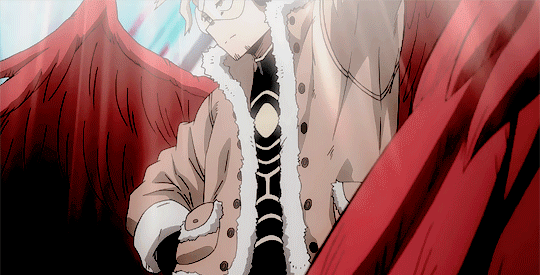
So, here we go, the list of head canons that I have for my beloved boy.
General
Yes, he has flown into a window. No he will not admit it.
Hawks can’t cook. He is used to microwave meals and quick meals like eggs, pancakes, bacon, ramen, spaghetti, and the like. Hence his love for chicken.
He has collapsed into bed without removing his gear more times than he would care to admit.
He is a bookworm. He loves to read. It’s one of his escapes.
His preferred genre is adventure, action, fantasy. Picture lotr, or noble knights doing good for their kingdom.
He likes to game. I would think Assassins creed, Witcher, LoZ, maybe even pokemon. He's not a hard-core gamer, but he dabbles in it.
He will zone out in a warm shower.
He loves sitting up high and looking at the stars and sky. His favorite place is the Kyushu tower.
He loves peace and quiet. It helps to calm his mind and allows him to think without outside stimuli.
His favorite pastime is allowing his mind to wander.
If he finds anything interesting or that he likes, he will research it to death.
He has RAD, depression, ADHD, hypervigilance, and hyper independence. Most of these are due to the upbringing of the commission. He also has abandonment issues. He hates leaving anything unfinished.
He DOES NOT trust people; this is due to the Commission. He always believes people are two faced. Even if people believe they are close to him, they really aren’t.
He has many layers to him. He is very complex. Most of the layers are barriers meant to keep people out and away.
He is insanely smart, despite acting oblivious.
He catches on quickly. Quick learner.
He has standards and morals, despite being morally grey.
Despite having rigorous training to control his features when emotions hit, some do slip. These micro-movements are specifically his wings and feathers. Puffing up, roosting, sharpening. These will give away his thoughts and feelings while his face is neutral. Only those close to him really notice it.
He has a mouth, and he uses it. It gets him into trouble. His wings and feathers usually get him out of it.
He will shut down and recharge after strenuous missions. This is the time when he likes to be alone and decompress, mostly sleep.
He has a soft spot for animals. He likes cats and dogs. He would love to have one day, but with his changing schedule, it would be hard to keep them. So, he sticks to the strays and the neighbors’ pets.
He would rather deal with kids than adults. Kids are much easier to deal with and honest vs adults who are shady and two-faced.
Despite being a ray of happy sunshine in public, Hawks is actually fairly quiet.
Hawks gets even quieter when tired. And it is noticeable. He doesn’t want to use the energy he has left. He also doesn’t want to say anything he would regret later. His filter is usually less during this time and he may say something that would sound mean when in reality it isn’t.
Despite being fast and quick, he is relatively patient. He doesn’t mind waiting, as long as it is for something he likes.
While praise is nice, from outsiders, it isn’t rewarding. But from someone he knows is genuine, then that is something.
Telling him thank you always makes him smile. Gratitude goes a long way with him.
He has Endeavor merch, but not as much as you think. A couple of t-shirts, a poster, and signed photo, plus a figure or two. But not a whole wall or closet filled.
Hawks is the kind of guy who is self-conscious about his wings. It has always been about his wings and what he can do, never him. He doesn’t like it when people see him and his wings or as his wings. He would rather have someone who can separate the two, and just see him as a human rather than his wings.
He sometimes uses his wings to his advantage and tries to make his personal bubble a little bigger.
His earrings are a sign of rebellion against the commission. Basically, saying you can’t control me or my body to them by doing it.
He would duck out of a massive party any chance he got. Whether it would be saying his partner was tired or phone call or whatever. He gets slightly overstimulated in large crowds, on the count of his wings picking up vibrations constantly, along with his wings also being big and not the best at keeping himself small and unnoticed.

Now for the fun random bits!
Hygiene
He smells like Marble. Beneath ozone and coffee.
He uses 3 in 1 body and shampoo when in a rush. But on days off he actually uses different soap and shampoo.
When in a hurry, he will usually shed his feathers so he can dry faster.
Hairbrush? What's that? He rarely styles his hair or brushes it. Usually one or two swipes with his hand and he's good.
Mint or spearmint toothpaste.
Quick rinse with mouthwash.
Food
He has a sweet tooth. He LOVES sweet coffee.
His go to is always chicken.
He is more of a savory kind of person.
He is a glutton when it comes to the food he loves.
Alcohol
He isn't an alcoholic. He drinks socially. He may have a beer or ale or cider every now and then, but he really doesn't drink. At parties he will have a wine or champagne. If it is a fancier party then a scotch, bourbon, or whiskey. Sometimes he will have a shot of sake.
Work and workplace
He is the kind of guy to give his employees merch as gifts. He will if he really doesn’t know what to get them.
He usually pawns new merch to try on his employees for feedback.
He does get to know his employees.
Sleep
He sleeps on his stomach or side. It is hard to sleep on his back with his wings, but he does sometimes. It is just uncomfortable. And gets wing cramps when he falls asleep with his wings bunched up.
He will sometimes shed most if not all of his feathers to sleep on his back.
His bedding is soft and fluffy. He has multiple pillows. He loves snuggling under his covers and duvet cover.
He is a pillow hugger. He loves his body pillows.
He sleeps in a loose t-shirt and boxers. Usually. He will sometimes go for sweatpants and a long sleeve shirt when it gets colder.
He is a furnace. He radiates heat.
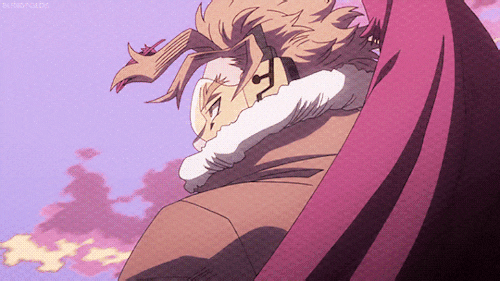
I have more. Let me know if anyone would like the other lists.
This guy lives in my mind rent free... I do have a love/hate relationship with him.
#bnha hawks#hawks#mha hawks#hawks headcanons#takami keigo#keigo takami#mha takami keigo#bnha keigo#mha#mha headcanons#hawks meta#keigo takami meta#takami keigo meta
121 notes
·
View notes
Text
You know, I think this ending would have been slightly less of a fucking disappointment if the heroes hadn't been so unfairly favored by Horikoshi compared to the villains. I mean, seriously
Deku destroys every bone in his body multiple times throughout the story and is warned that if he continues, he'll permanently lose the use of his limbs ? Everything's fine, his body's just got used to being reduced to a bloody pulp somehow so there's no consequences for him. In fact even when he literally loses his arms to Shigaraki, he gets them back two minutes later thanks to Eri because guess what ? Her horn still works even when cut off from her body. How convenient.
Gran Torino gets his ribcage obliterated by Shigaraki ? Don't worry guys, he'll survive that despite his old age and injuries, and this to have no particular role in the plot afterwards.
Bakugo dies heroically trying to buy time before Deku arrives ? Lmao, did you really believe it ?? No of course not, Edgeshot just uses his last-minute Deus Ex Machina to save his life at the cost of his own and- Oops nope he's fine too, my bad !
Hawks murders a criminal fleeing for his life in cold-blood ? The best Hori has to offer is him completely free and in charge of the HSPC.
And no, losing his quirk isn't a real consequence for him because not only it literally played a major part in saving the world with Vestige!Hawks raising an insurrection among AFO's quirks, but also because his quirk has always been the element through which people exploited him.
Endeavor abused his family for years and completely destroyed his eldest son ? No jail time and no media backlash for that, the only blame he received was due to the heroes' failure to stop the League during the Raid Arc.
And don't even get me started on this bs about facing hell or whatever for what he's done : He's literally free and wealthy ; he has Rei, Fuyumi, Shoto, his sidekicks and Hawks on his side ; and all the difficulties he's apparently going to suffer are off-screened.
Deku had to sacrifice OFA and his future hero career to save the world ? Guess what, Bakugo invested all his time and money to make him an Iron-Man suit and now he can still be a hero with everyone else.
There are plenty more examples of this but I think you get the idea. Now let's take a look at the villains' ending :
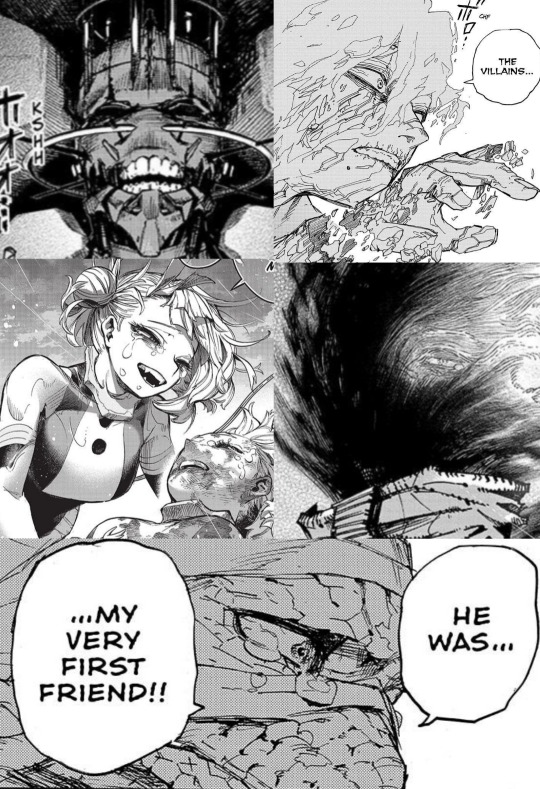
Toya is now a piece of charcoal kept artificially alive for the few years he has left, unable to move a finger, and whose few minutes a day during which he can stay awake will be spent talking to his father who abused him as a child.
Toga, a literal teenager, killed herself to save Ochako and because she knew it's still better than rotting at Tartarus her whole life.
And not only did she die but she did by bleding to death. Let me repeat for those who have trouble grasping what I've just said : In a manga where the heroes can survive having their heart blown to bits, being impaled Kakyoin-style or smashed against buildings like a fly on a windshield, one of the main antagonists died of a fucking hemorrhage…
As for Shigaraki, after learning that his very birth and all the tragedies of his life have been orchestrated by AFO, after all this development and narrative promises about him being saved in the end... Deku just kills him.
Because despite all his speeches about saving him, it seems like the best our MC could do was beating him both physically and mentally until he crumbles to dust…
Compress on his side is apparently locked up for life and kept alive by machines too.
A begging Kurogiri tried in a desperate attempt to save Shigaraki, only to be unceremoniously blown up by Bakugo and dying off-screen without anyone giving a shit, including Aizawa and Mic.
And Spinner will now spend the rest of his life struggling with the extra quirks inside him that affect his body and mind, while having to cope with the thought that his boyfriend best friend and companions have either died alone or are locked away for life in horrifying circumstances.
Clearly not the same as with the heroes...
Now don't get me wrong, even if they suffered just as much from the consequences of their actions or the plot as the League, this ending would still be a disaster in terms of writing but AT LEAST it wouldn't reek that much of hypocrisy.
#bnha spoilers#bnha 430#bnha#mha 430#bnha epilogue#endeavor#enji todoroki#izuku midoriya#tomura shigaraki#jin bubaigawara#toga himiko#shuichi iguchi#kurogiri#dabi#touya todoroki#hawks#takami keigo#league of villains#bnha meta#my hero academia
1K notes
·
View notes
Note
Why does everyone treat Hawks having always been an assassin as canon? I know he was brought in as a replacement for Nagant but as far as I’m aware there’s no actual proof he killed anyone before twice
You're right! We've never been explicitly told he has a kill-count of anything but 1 (rip Jin). However (honestly you knew this would make me actually write, didn't you?)....
1. The HSPC has changed (somewhat)

It's spelled out to us that Madame Prez wasn't like her predecessor. Her methods weren't as brutal, she was way into a war of information. In some ways, crueler. Kaina wasn't executed - instead she had her hair shorn and was defamed, humiliated.

Nagant assumes Keigo has been used like her. Horikoshi says Madame Prez groomed Keigo from a much earlier age than the middle school-aged Kaina so he had way less ability to leave or question (additionally, he was so sheltered from society and marginalized that he simply would have been incapable until he was an adult).
This is what the story says outright. So, yes, you're right - everything else is speculation. But then the question is why people believe this is canon outside of the typical abysmal literacy found in this fandom?
2. But Hawks being Hawks doesn't Make It Easier
Truth be told, I'm on your side. I used to very much doubt he had much of a body/kill count. I still think it might be single digits if we consider actually murdering someone with his own hands/quirk, though I suspect he might be responsible for deaths in other ways. I would have completely accepted Jin being his first (and only at this point) murder.
So why did I change my mind about this? Simply; Keigo's a fucking freak. I say this with love.
Every so often Keigo says or does something in this manga that both confirms he's kind of insane and in a very different moral space than everyone else, and just off-handedly mentioning he went and, after being subjected to third degree burns and essentially losing limbs, immediately went to eliminate every last sample even after the battle (where he was carried off by Tokoyami mind you) as in....destroying Jin's body or ensuring no one can use it. He's offended when it's clear Dabi got the better of him with this.

Mind you, he's the world champion at repressing his feelings, duh, but the fascinating way he speaks about this (a minute after screaming they NEED TO KILL JIN AGAIN) speaks volumes. Keigo's completely undaunted about handling death and its aftermath. If he's never killed before, he's been certainly trained to in a way that he handles it professionally.
There's one more thing that makes me think Keigo did kill before Jin. We can argue over how much Keigo hesitated killing Jin, but I think it's a point in that he did in how much he ABSOLUTELY does not with All For One.

Like he does not hesitate. Immediately tries to put a feather-knife through his brain. Logically, I mean, I think anyone would try to one-shot AFO because the more time the man that has (until he rewound himself) the more time he has to fuck you up, but still. He tries to stab through his man's head as soon as he gets out of the portal.

Here's Keigo just admitting it, albeit saying he expected it wouldn't work, but really, he's more apologizing he can't immediately kill this man.
No hesitance.
My final piece of evidence is that Keigo is currently walking around Japan in a suit with a katana begging mfers to "try it bitch". Like being quirkless, not a hero, none of that is stopping him if he needs to defend himself. And it's not like he can pin someone away with his feathers. Nor does he have dozens of daggers at his disposal anymore, just one blade. He's the type to try and finish things quickly as the manga has shown time and time again. I really hope no one actually tries to assassinate him because there's an extreme likelihood he'll just decapitate them in the SPC boardroom.
3. Red, Red Hands
To recap, we know Keigo has been trained to kill, in a multitude of ways (and not only with his quirk), and has always seen killing as option/tool he can use. The HSPC might not be as eager to kill as Kaina's era was, but they raised Keigo with the intent to use him to be able to kill people and cover it up. While there's no proof of other murders, there's proof he's been given the training, tools, and expectation to kill. And his attitude towards killing isn't making it seem like he's not done it before. Of course, he's not agonizing over it like Kaina, which makes me think he was used sparingly to kill.
But the other thing to ask is - will Keigo continue to kill (and not like in personal defense) or lead to the deaths of others? He's already set on reforming the Public Safety Commission by allowing for the reform of Villains who cooperate, renaming the Commission to distance itself from solely heroism... We're still a few chapters away of seeing what this new president has in store for society and how he'll distinguish his methods from the people who created him, but we also have two hundred and fifty chapters of him expressing dislike of how he's used, so perhaps it's fair to say he's not continuing the cycle?
187 notes
·
View notes
Text
reposting this twitter thread here in case their twitter account gets nuked








#hawks#keigo takami#shouto todoroki#meta#analysis#ive seen too many good posts lost to the void so i wanna preserve this sorryyyy#mha meta#bnha meta
141 notes
·
View notes
Note
What are your thoughts regarding how Hawks views his idol, especially post-war, as he moved on so fast after the truth was revealed by Dabi. Because it seems like a paradox here: how can he be a pragmatic thinker while not questioning Endeavor's actions and following him blindly? Or is it just another one of his optimistic extremes?
I mean, it's not like Hawks has a lot of room to talk. He was exposed in that very same video from Dabi when he killed Twice. Suddenly turning on Enji may just be a tad bit hypocritical.

Joking aside, there's a lot that could be said about Hawks and his reaction to Enji's history. While a lot of fans attribute this to Hori reducing Hawk's character or excusing what Enji did, that is not the case. Because I feel like this is more about Hawks and his character than it is about Endeavor. If you want to go from a purely pragmatic standpoint, Endeavor is one of the best fighters that the heroes have at this point. Keeping him around and keeping his head in the game until after the war is the best option for everyone. Hawks putting aside his feelings is the pragmatic choice. Which kind of plays a part in this, but it has more to do with his actions than his motivation. Because his support has nothing to do with Enji as a person and everything to do with Endeavor as a hero. That means helping him fight and keeping his head in the game. Which could be part of the reason why Hawks doesn't really react or deal with this. He's very much a self-sacrificing, big picture kind of guy. There are way bigger issues to deal with, and he isn't really giving himself time to process.
The big reason why Hawks doesn't have much reaction is explained in the in-between chapters of around Chapters 299 and 303. Hawks believes that Enji has changed from the person he was before, and he wants to support Endeavor for the man he is rather than the man he was. Which, yes, could be rooted in his admiration of Enji, but I think it comes more from his optimism. Hawk's isn't blind to whom Endeavor is, for better and for worse, but instead chooses to help and support Endeavor. Because so much of who Hawks is is defined by him helping others, especially when it comes to other heroes. Hawks isn't defending Enji at any point in this. He just wants to help Enji because Enji is trying to be better, and Hawks wants to support that. To Hawks, yeah, Enji did some bad stuff. That doesn't erase all of the good he's done as Endeavor or invalidate his genuine attempts to reconcile with his past actions. Did we miss out on Hawks really dealing with Enji's reveal? Maybe, but I think the route taken is more true to his character, his place in the story, and the connection he has to Enji.
55 notes
·
View notes
Text
BNHA and Japanese law, aka why Enji and Hawks can't go to jail
I think it’s fair to dislike BNHA ending.
However when I see posts saying they don’t like it because neither Hawks nor Endeavor ended up in jail I think it’s important to remember that, in Japan, when BNHA was written:
Law enforcers can murder escaping criminals provided said criminals were judged dangerous enough (just so you know Japan had been asked to revise its domestic legislation on police use of firearms to ensure it complies with international law because currently it still doesn’t).
Although domestic violence is forbidden by 2001, Japanese law does not provide for domestic violence in terms of prosecutorial considerations. At the time BNHA took place the police wasn’t even obliged to investigate when ‘domestic disputes’ were reported, and the most they would do was offer counseling. The law has been changed in 2024 and things are a little better (even though Japanese law STILL does not provide for domestic violence in terms of prosecutorial considerations police is encouraged to investigate and the court may consider to impose penalties for crimes related to domestic violence aka assault and injury), but Japanese women still complain that, despite the improvements, it’s extremely hard to have their abusers punished.
Parents were banned from physically punishing their children solely in 2019 (BNHA started in 2014, Vol 21 was still printed in 2018, meaning the Todoroki saga was established PRIOR to this) following several fatal cases of abuse dealt out in the name of discipline however Japanese law does not provide for this in terms of prosecutorial considerations. The most that will be done is to take the children away if they fear for their life.
Abusive training (which includes beating, name calling, humiliation, overworking…) is not forbidden (although guidelines recommend not to do it) and, of course, as a consequence, Japanese law does not provide for abusive training in terms of prosecutorial considerations. People are protesting about this (notable protests had been done during the Olympic games) as people had also committed suicide over this. By the end of BNHA as far as I know, nothing was done.
Children of third-year elementary school age and below can be left unsupervised. A 2023 attempt at changing it due to unsupervised children dying was met with severe criticism nationwide so that in the end nothing was done.
Arranged marriages (as in parents picking up a candidate for their child to marry) are legal. The children have however the power to refuse a partner presented to them by the parents. Also, when organizing an arranged marriage it’s fair for both parts to investigate the other party and check if the family doesn’t have undesirable genetic traits (mental illness cases, lack of pure Japanese blood, relations with people belonging to groups considered impure) so that the children won’t inherit them.
Now, I oversimplified what are in truth a lot of regulations and rules expressed by the laws and compared Hero training to sport training (I digged a little more deeply on this sort of things in this post) but, long story short, Enji and Hawks don’t escape jail because they’re rich, because they’re high in ranking, because they have connections or bribed someone. It’s just because law doesn’t consider punishing them and law wouldn’t punish them even if they were commoners like, let’s say, Kotarou or Himiko’s parents.
Also, Horikoshi is basically showing the negative consequences of all the above mentioned points, which can be viewed as a subtle way to criticize such things.
So, again, it’s fine if you hate BNHA ending, but please, don’t think Horikoshi is just letting those guys break law without consequences just because. If they don’t end in jail for such things it’s exactly because people normally don’t do it and that’s why we’ve the League criticizing society for how wrong it is, not just their abusive parents. Society enabled the abuse and you might very well see the League as a representation for the Toyoko Kids and the Jōhatsu.
Also, just in case, I'm not Japanese and just saying Japanese law doesn't think they should be punished, doesn't mean I agree. Just that I don't expect the story would follow my country's law.
If you want to know more about Japanese law please, research about them. It'll give you a better perspective on why some things in BNHA go the way they go.
69 notes
·
View notes
Text
Read if you're interested in what actually happened, not what could've happened.
The writing from Hawks' perspective may be inadequate but there might be some hidden meaning lurking in this small panel from chapter 381, and now that it's got animated in today's episode (155), I'd like to share this analysis:
What does Hawks mean by filthy/ragged/dirty wings?
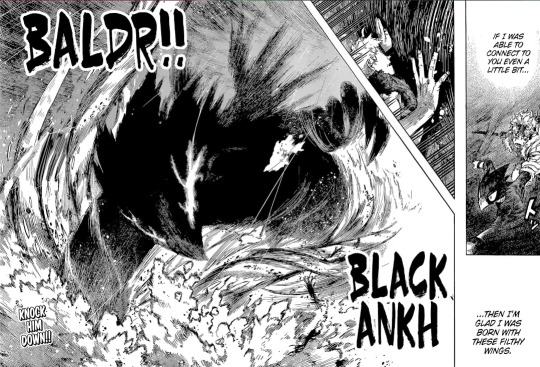
Here's another translation:
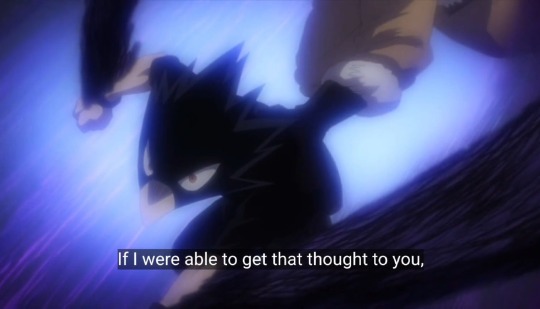
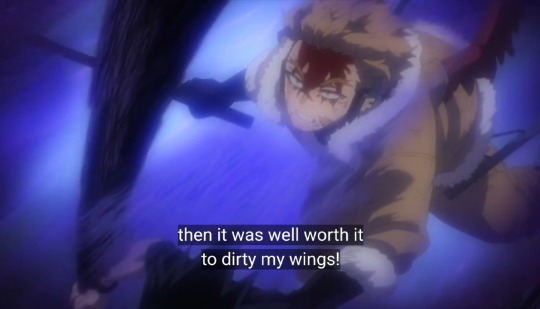
#mha#bnha#my hero academia#boku no hero academia#bnha hawks#hawks#keigo takami#takami keigo#tsukuyomi#bnha tokoyami#fumikage tokoyami#tokoyami fumikage#mha spoilers#bnha spoilers#mha season 7#bnha season 7#mha meta#bnha meta#hawks meta#c&e#c&e : connections & explanations
55 notes
·
View notes
Text
Anti-Endhawks takes to debunk

"Endeavor is 46, and Hawks is 23; why do you ship them?"
That's all on personal preference, tbh. It's cool if you find the age gap to be uncomfortable. It's important to point out that both characters met when Hawks was a pro-hero (meaning he was already an adult when they first started working together as a duo). Endeavor himself did not know of Hawks when he was younger. If Endeavor knew Hawks as a child and the relationship was formed due to that, then I would also have an issue with the ship itself and understand this saying for argument purposes.
There is already a canon age gap between Gentle and La Brava, and no one talks about how the age gap is bothersome for them, with Gentle being in his early 30s and La Brava in her early 20s. I think from what I've been seeing that people just don't like Endeavor as a character (which is fair if that's the case. You don't have to love his character or anything). Still, it would be good if some antis were honest about using this take as a reason to shun the ship in general.
"Endeavor is still married to Rei; therefore, he is still connected to his family that they had."
Yes, Endeavor is a part of the Todoroki storyline since his perspective alongside Touya and Shoto's is very important for readers to pay attention to. His relationship with Rei Horikoshi has shown that it quickly changed despite their relationship starting out as wholesome and healthy in the early stages. We see very fast that the love that Rei and Endeavor once had turned sour once they began having children, and Endeavor tried to push his goal of having that perfect child with the ideal quirk. Now, whether the two reconcile and come back together is anyone's guess; I'm assuming that Horikoshi won't have Rei and Endeavor get back together, and they will most likely separate due to everything that has happened in their relationship and family in general.
This reasoning, out of all the anti-endhawk ones, is probably the most reasonable if I'm being honest, since the Todorokis are shown still having some connection back to each other. We are still determining how the aftermath of it all will play out.
For story purposes, he is very much connected to Rei since they both are responsible for saving Touya. But it's good to note that when it comes to Endhawk's relationship, they don't display the typical power imbalance that most people would expect from out-of-age gap ships. In fact, when it comes to their overall dynamic, both characters respect each other as equals and have this bickering/bantering dynamic, especially during their early interactions; they both care for one another, as seen in the panels below.
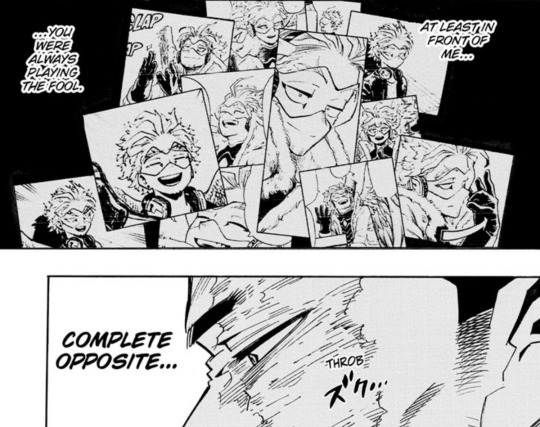
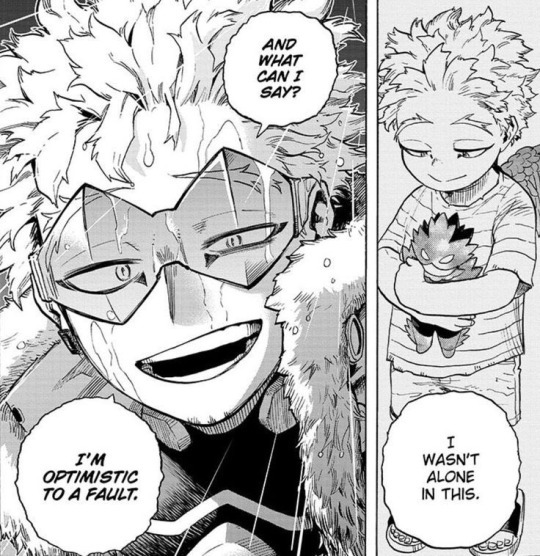
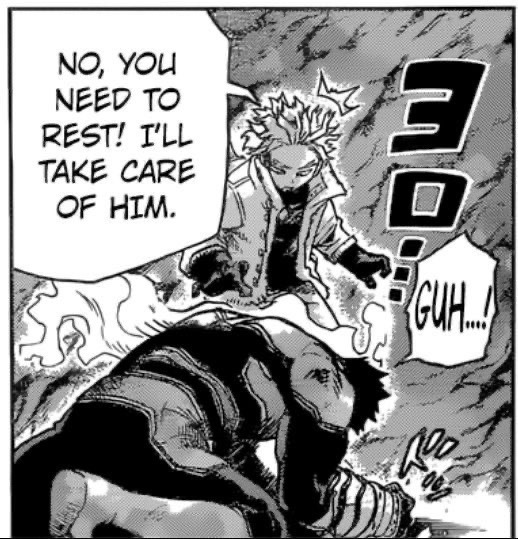
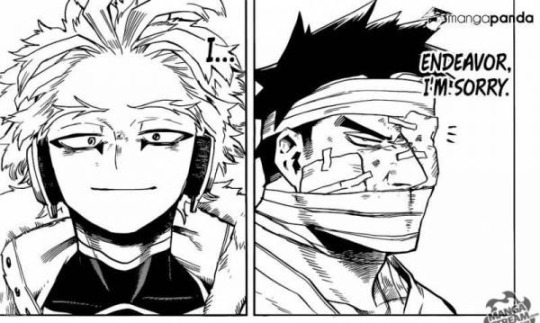
"Hawks would hate Endeavor if he knew his past."
This take has been a common argument circling around the fandom before Dabi broadcasts his reveal to the world. I have to say, I was curious what Hawk's thoughts would have been if he found out Endeavor's past, but after he explained that despite the wrongs Endeavor has done in his life, he still would support him and do his best to help him out whenever he needed him. To me, it showed how much he trusted him; he views Endeavor as the person who is trying to atone for everything he has done to those around him rather than the person he once was; and this trust that the two of them have extends into the final arc as well.
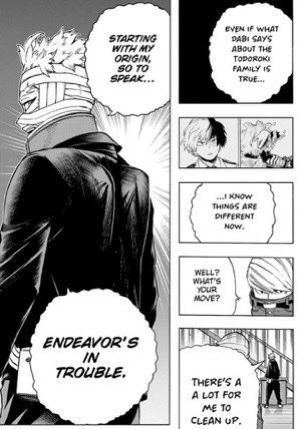
If there are other takes I should probably tackle; I'll make a separate thread for those. But I am also working on a Bakudeku version of this as well (so look forward to that one 😊❤️)
#bnha#my hero academia#mha#boku no hero academia#boku no hero#endhawks#endho#enji x keigo#enji todoroki#keigo takami#endeavor x hawks#scftizuku meta#endeavor#hawks
159 notes
·
View notes
Text
Realized just now that Dabihawks also kinda embody an inversion of the “Win to Save/Save to Win” dichotomy (and ironically, one that feels more balanced in execution than the original usage).
Hawks’ overarching motivation is societal good: He wants a world where people are safe and heroes are no longer necessary. But he is (was raised to be) a brutal pragmatist. He is willing to do whatever it takes to win, including murder someone he feels admiration and affection for, so long as he believes it is necessary to achieve that idyllic future. His ‘Win to Save’ isn’t all that heroic (or rather, it represents the corrupt ethos of contemporary hero society as a whole).
On the other hand, Dabi’s driving motivation is to win against (again, kill) Endeavor. Yes, early Dabi talks about believing in Stain’s philosophy of false heroes more broadly, but Horikoshi seems to drop that aspect of his character in Act 3 to paint him as singlemindedly obsessed with revenge. And yet! He burns down Toga’s parents’ house so she won’t be trapped in the past.
Dabi claims that this kindness is ultimately self-serving, which seems doubtful but does gesture at a larger truth: He joined the League specifically to attain a position from which he could strike at Endeavor, but he couldn’t do it while staying detached. He put his trust in Shigaraki as a leader, and he put his care in the other LoV members like Toga. He becomes someone who would be moved to ‘Save’ Toga from her ghosts on the path to ‘Win’ against his father.
32 notes
·
View notes
Text
Todoroki: The Mountain, the Hawk, and the Haunted House Part 1
Link to the Todoroki family presentation: Part 1 | Part 2
Link to the Bakugo presentation 2.0: Part 1 | Part 2 | 1.0: Part 1 | Part 2
Link to the Kirishima presentation 1.0 | 2.0
Link to the Todoroki presentation
Link to the Deku presentation
Link to the Uraraka-Bakugo-Toga presentation
Link to the Shigaraki-All for One presentation
Link to the Spinner-Shigaraki-Bakugo-Deku presentation
Link to the BNHA presentations masterpost
In the online fandom system, domestic abuse offenses are considered especially heinous. In the My Hero Academia fandom, the dedicated fans who create the discourse around these fictitious felonies are members of an elite squad known as the So (you think these) Victims (are the most special characters) Unit, or SVU.
These aren’t their stories.
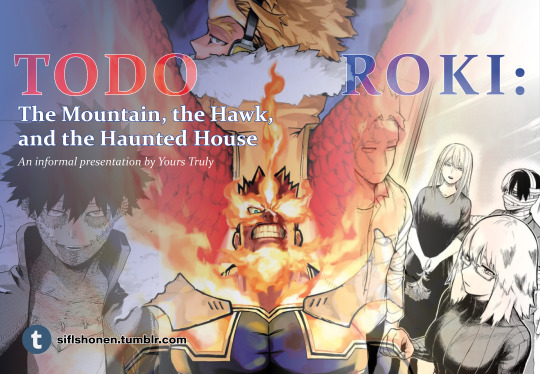
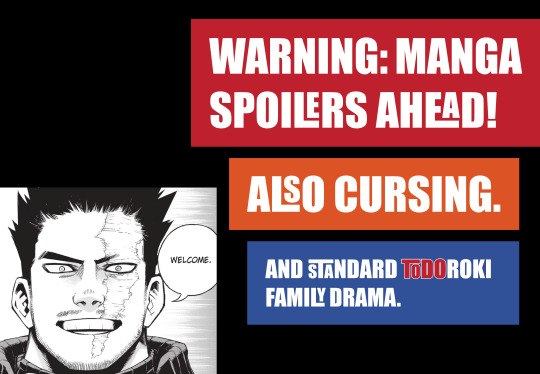
Whenever a work from one culture or language is brought to another (or even if the work stays in the same culture but transitions from page to screen), the translators, localizers, and creative team handling it can only do so much to help the new audience understand what the original work communicates through subtext or cultural associations by deciding how much of the work to leave out or change. In other words, the team must choose how to fail.
In the case of the Todoroki family, I feel there is much lost in translation. Or, at least, there is much lost if the reader doesn’t share the work’s original cultural background. I’m going to try to make my point with a poem.
Four children are mine
And I love my four children:
An arrow to ward away the darkness
aimed for the light of the dawn;
The winter, who brings the night again, beautiful and longer;
Next the summer,
who returns the sun at its zenith;
And small is the leader with clear sky and dusk rain in his eyes.
Four children are mine
And with four comes death
The arrow flies too high from the bow
The arrow flies but falls to darkness
From a shrine in the mountain, he aims for me.
My son haunts the mountain near the peak
I fear the mountain I cannot climb
I fear the arrow meant for me.
Winter settles quietly
Summer turns away from me
The leader makes a mirror of my heart
I tell my son I love him
And I look in the mirror yet I cannot face it but to watch it crack
My son is my spitting image
I tell my son I love him
I tell my son
Without looking into his eyes,
I tell my son I love him
As the arrow flies.
This poem is about Enji Todoroki and his children - the four he actually fathered and the one for whom he unknowingly acted as a surrogate. The poem vaguely alludes to the meanings of the children’s names with one notable change - for Shoto Todoroki, instead of calling him “charred frozen” - which is basically how his first name is written - I called him “leader”.
When written with different characters in Japanese, “Sho” can mean “leader.” So, while “leader” isn’t the true meaning of Shoto’s name, I decided that it was thematically fitting to use since he’s also the “hero of his family” and leads the way for them to continue into the future. In changing the meaning of Shoto’s name, I chose how to fail. Yes, it’s imperfect, but by putting in the work, I can at least show you how I arrived at the destination to help you better understand what you are reading. Much of what I’m about to write about falls into this category - it’s not exactly the perfect explanation or whole, unaltered, canon truth, but is supplementary information to help you come to your own conclusions.
Anyway, now that I’ve told you the poem is about Enji and his children, it probably comes off a little differently, huh? That’s the power of writing allegories and using recurring motifs. If you have not figured it out already, you’ll learn soon enough what words symbolize each child.
Now, let’s break down this already broken family. There are so many damn Todorokis that I’m going to do something very, very rude and call them each by their first name for the sake of clarity (and also because, frankly, it’s a more honest representation of how I actually feel about these characters.)
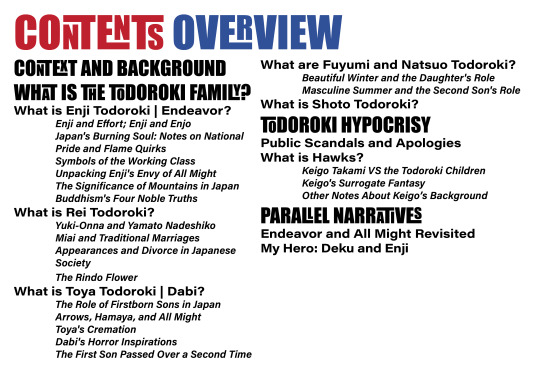

What is the Todoroki Family?
The challenges facing the Todoroki family - such as the pressures Enji feels, the disappointment and internal crisis Toya inherits, the social and marital prison in which Rei finds herself trapped, the nature of the public’s feelings of betrayal at the reveal of Enji’s family dysfunction, the social snafus and ugly family dynamics in which Natsuo and Fuyumi are often caught - are distinctly shaped by the series’ Japanese society. There’s a special je ne sais quoi quality to their family drama that feels authentic even to me, and I’m a foreigner to these cultural tropes. It’s a little disturbing.
But, besides a fictional family, what are the Todorokis? What purpose do they serve in the story? What is their purpose within the narrative, and what is the purpose of the narrative in which they exist?
Well, on the one hand, the Todoroki household can function as an allegory for traditional Japanese families, society, and power structures (we could use the word “patriarchy”) crumbling under the pressures of modernity and a changing world, which is similar to how the Shimura household functions in Shigaraki’s backstory, or even the story of All Might’s retirement. On the other hand, they are a case study of a deeply flawed family that, if the magic-powers quirk element was not present, could exist in the real world.
They make for good drama. But every member of the household serves a purpose in the narrative, in the family, and in the meta. Usually, these three things work together for a greater purpose.
What is Enji Todoroki?

I didn’t say, “Who is Enji Todoroki?”. I said, “What is Enji Todoroki?”
If you said, “an asshole and shit father,” well, yeah, you’re sure on to something! But it’s not helpful to disengage with a major character in a work if you want to understand what the hell they’re doing in the narrative. I’m not telling anyone to like Enji, or any Todoroki, but I am asking that you entertain the concepts behind them with an open mind, if not an open heart.
What is Enji Todoroki? Much of this should be obvious in any language, but I’m still going to break it down.


The manga tells us pretty blatantly that he is a man from an older generation struggling to remain relevant in a new and changing world. He is ambitious, prideful, hardworking, hypocritical, and wholly dedicated to his job. He’s the patriarch in a household structure that is no longer relevant and coming apart at the seams. But most of all, Enji is afraid that nothing he does will ever be enough.
What is Enji Todoroki? Enji is someone who tries his hardest at anything he does even when it sends him to ruin.
Enji and Effort; Enji and Enjo
In my Bakugo and Deku presentations, I mention that the concept of talent as a fixed quality is predominantly accepted in the west while a common eastern perspective posits that talent is something developed over time. The distinctly Japanese Enji and his personal conflict over the existence of the “natural born”, western-coded All Might thrusts these implied concepts of talent from subtext (not that they were particularly hard to identify throughout the manga) into blatant text. And I’m not just talking about the moment where Enji thinks to himself, “I have always envied natural-born superheroes.”

The written characters for Enji’s given name means effort. The name also sounds like another word for “fuckin’ honkin’ bigass fire”, Enjo, but for our discussion, Enji means effort. Endeavor, his self-chosen hero name, also implies the application of effort.
Everything about this man is defined by his efforts, even when they are in vain. Everything.
He pours his effort into becoming Japan’s greatest Hero. He pours his efforts into escaping the fate of his father. He pours his efforts into making the most terrible domestic choices possible to try to be enough for his family. He pours his efforts into atoning for his transgressions against his family, and then again for those against society. And it is not enough. He knows it is not enough, it never will be enough. Not one thing he has ever done in his life has been enough for him, enough for his family, enough for society. It is never enough. This is his burden.
You don’t have to feel bad for him about it, mind you. I’m just telling you that it is, functionally, his core struggle.

Enji poured every bit of himself into looking away from his son Toya and into running away from him. It’s going to take every bit of effort within himself to stand his ground and face his son again, and even then, he is still going to need help. Perhaps that’s pathetic, but even Enji knew he was only going to be a professional Hero, never a superhero.
Enji is a man who believes, who is basically required to believe, who likely cannot continue to exist if he does not believe, that his value and justification for being is defined by his ability to pull himself up by his bootstraps, or to just keep struggling in the endeavor.
He pours his effort into everything he does and curses his own weaknesses. Even struggling takes effort.
Japan's Burning Soul: Notes on National Pride and Flame Quirks
In my Kirishima presentation, I talk extensively about kouha and their manly aesthetic as it applies to symbols of Japan. What the presentation doesn’t talk about are flame motifs.
In Japan, flames are seen as purifying. They are also seen as manly, and not just in the way Kirishima defines it. There’s several phrases in Japan that talk about stuff like “a burning soul” or even “Japan’s burning soul” or the “blazing spirit” of a Japanese youth. Well, I think these are just about as tacky as they sound but in the same kind of boyish, tacky-cool way most shonen anime can be.
I’m talking about the flame motif on festival jackets. I’m talking about every time Galo from Promare talks about his “flaming firefighter soul”. To some extent, I’m talking about the flames on the Hokage jacket in Naruto (Minato’s and Naruto’s jackets get the flames as a nod to their shared mentor Jiraiya, who is a whole-ass conversation about masculinity in culture, theater, and mythology in and of himself.) These examples are indicative of each of these characters’ pride in their masculinity and in their nationality. Enji’s flame quirk and his constant use of flames as a brand are no exception to this trend.
Some minor characters, and later Dabi, allude to the fact that flame-based quirks are somewhat common in MHA. I’m not completely certain if the prevalence of flame quirks is also meant to indicate that these quirk holders share the same sort of “flaming spirit”, background, national pride, or even miscellaneous political views, but somehow I get the feeling that it does.
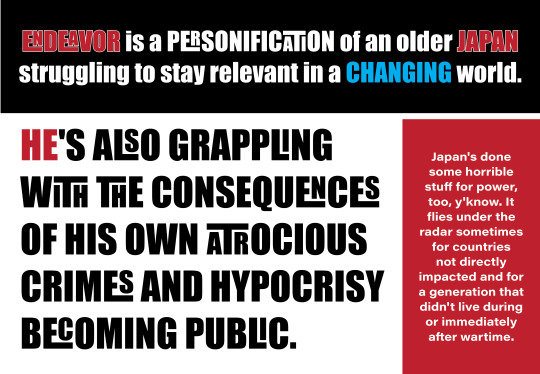
These people are, on some level, connected in that they possess the flaming soul of (masculine, old, patriarchal) Japan. The existence of Pro Hero Endeavor is a representation of the traditional, conservative Japan’s soul. All Might may wear red, white, and blue (and yellow like a yellow-haired westerner) to represent a certain set of foreign ideals, but Enji wears the red and the blue with distinctly Japanese pride.
The Colors of a Nation

Red and white, the colors of the Japanese flag, have strong cultural connotations through Japanese architecture, festivals, and shinto practices. (Please keep in mind that colors can mean a lot of things in every culture depending on context, and in Japan, different shades of the same colors can also hold distinct meanings. For example, certain shades of blue are often worn by villains in theater, but blue is not always “evil” or “villainous” by default.) But the color that I personally associate with Japan is blue - specifically, anything dyed with the aizome technique.
Aizome clothing, or clothing dyed with indigo, transitioned from being a nobility-only thing to one of the few colors that commoners could wear starting in the early 1600s - because by then, bright colors were exclusive to the nobility. The indigo dye is also popular for its antibacterial, insect repellent, and flame retardant properties. Firefighters wore it. Samurai wore it under their armor. So it’s not surprising to me that Endeavor’s Hero costume, and that of his son, would use fabric in a particular hue of dark blue.
Also? If you wanted to know? Aizome is used to dye Japanese blue jeans today. Hey, Best Jeanist!
Anyway, Enji is dressed in the color of the common Japanese man, the firefighter, the samurai, the noble laborer or honorable servant - but definitely not of high nobility.
We don’t know a ton about Enji’s background in detail, we know he wasn’t born ungodly rich. We know his father died. We know he went to UA. He made money from his Hero career, and married into a pedigree. Yes, he chose Rei because she had an ice quirk, but got the bonus of clout and old world connections.
So, uh, yes, the marriage of Enji and Rei was one of new money and big ambition married to old nobility and traditional values, and that’s true even when taking the kids out of the equation. But more on Rei and the marriage later.
Unpacking Enji's Envy of All Might
The majority of Japan’s political scene is conservative. (Look at the ideology column in that table, NOT just the name of the party. If you’re a westerner, I realize that identifying which ones are conservative is going to be particularly difficult to do given their translated names.) The Jiminto, or Liberal Democratic Party (again, look at the ideology column, NOT JUST THE NAME OF THE PARTY. Remember that “liberal” and “democratic” can hold different connotations in different countries!) was founded in 1955 and, despite having a nebulous identity beyond being “kinda to the right”, continues to hold a significant majority. Over the years, the party has commonly been seen as reliable, stable, and able to get the job done. Well, except for during those periods of time when the scandals came out.
This is not unlike how the public of MHA saw Endeavor. Well, until the scandals came out.
Now, I do not think it is correct to say that Enji = the Jiminto and leave it at that. (I would, however, call him a personification of Japan’s modern patriarchy, or at least something pretty damn close.) His dogged, openly vocalized grudge against All Might is more extreme than what the majority of the Jiminto might openly express, especially considering their consensus of policy regarding the US. I only want to give some context to the longer-standing political scene of Japan as it affects the modern day.
See, while Japan and the US have had an enduring relationship and are, uh, well, allies now, the older generations of Japan, particularly in rural areas, still hold deep grudges against the States and are bitterly, bitterly angry at the cultural imperialism and the military takeover and the government policy changes and the economic changes and the, well, the everything. Actually, the mutual cycle of envy between the Japanese and US citizens detailed in that Times article is important to remember from both perspectives. There’s old bias against each country lingering in both directions, and, while not a direct reference to how it remains in the Japanese population, understanding how it affected the creation of Japanese internment camps in the US is very illuminating in understanding the public US sentiment about the Japanese before WWII then after it.
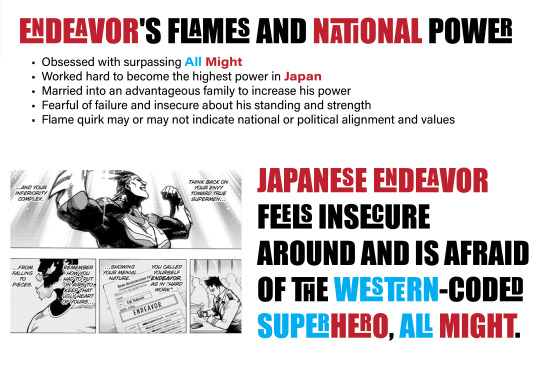
When Enji, (or Endeavor), discusses his inferiority complex, he gives away the game and makes the subtext of the rampant western envy present in many of the characters in the work burst out into just plain text.

While Toshinori Yagi is a Japanese man, the power he inherited, or what Enji (and the world) wrongly believed was “natural-born talent” (a western concept), blatantly signals “western power” through his costume and art style (US comics!) and he represents the “band-aid” of temporary western military and socio-political power imposed upon Japan.
The US is considered a superpower, after all.

That said, I do feel that giving the western-appearance clout (and magic quirk) to the Japanese Yagi aptly communicates that there is nothing naturally special about the US or its citizens, or really anyone who has power. All of that misunderstood “special glow” or “flawless perfection” or “incontestable strength” are just appearances, presentation, circumstances, and luck - nothing more and nothing less. Yagi (who is, again, Japanese, so this is a Japanese man displaying the incredible aptitude for superheroism, to Enji’s surprise and probable chagrin) may have had a knack for using the quirk and therefore was the greatest at winning and saving, but he also destroyed himself trying to be the perfectly westernized superhero.
Also, by comparing the obviously westernized Katsuki Bakugo and pridefully Japanese Enji Todoroki, Horikoshi makes his point that a shithead is a shithead regardless of nationality, background, or philosophy.
At the same time, both characters have the ability to change.
Speaking as someone from the US, I’m conflicted, humbled, creeped out, and very emotional over the fact that Horikoshi has chosen to have a complicated, sometimes critical (early Bakugo’s westernisms are not flattering, and the westernized persona of All Might is an unsustainable, unrealistic, unfair thing that destroyed the man maintaining it), but overall kind, laudable, and compassionate portrayal of characters that stand in for the west.
I’ve heard Horikoshi has been criticized as a “freeaboo” for the open admiration of the west inherent in My Hero Academia. I’ll admit, I think he might be a little bit of one, but I’d be the cat calling the monkey a long-tailed bastard if I didn’t also admit that I’m a bit of a weeaboo. We can be mutually embarrassed about how much we like each other despite everything, I guess.
But back to Enji and Yagi. Enji bitching about All Might and expressing disgust over his “American” presentation and perceived advantage is, um. Well, I could call it an example of him making excuses because Yagi is actually Japanese, but it is true Yagi gained experiences and some training advantages in the US that Enji did not have. And, like, Yagi also got a magic quirk (from another Japanese person.) That’s something.


But I digress. The irony and realities of Enji’s envy and self-deprecation could be debated all day, but it doesn’t lessen the stink of hostility and western envy wafting off of it.
The Significance of Mountains in Japan
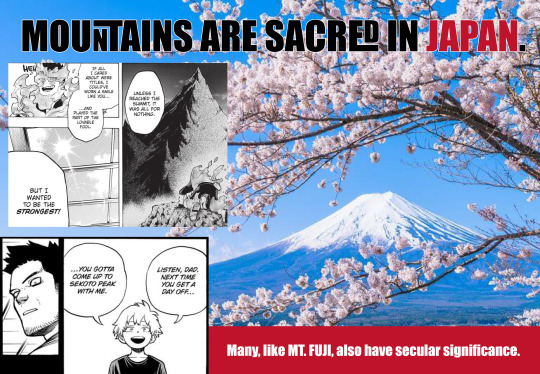
You know about Fuji-san, or Mt. Fuji, the largest and most iconic mountain of Japan? Awesome, because it’s Japan’s most famous cultural site and a great case study for how the Japanese view mountains as sacred. People hike Mt. Fuji and other sacred mountains for secular reasons, too, sure, but many do so as a spiritual pilgrimage. It’s a mixed bag, sort of like how, in the west, everyone is impacted by and understands Christmas despite how it’s primarily only modern Christians that have religious traditions regarding it.
Sekoto Peak, the in-story location where Enji sometimes trains and Toya burns himself, doesn’t actually exist and therefore has no real-life associated myths, but Enji’s choice to train on it indicates much about his discipline. It also provides a quiet association between honing his abilities to their pinnacle and his connecting to the understood sacred power of the mountain. There’s a mystical element to it.
Most, if not all, Japanese mountains are considered sacred in some sense no matter how tall or pretty they are. This is just understood. Many mountains are the sites of one or more Buddhist or Shinto temples.
Ah, and since many mountains are volcanoes, it shouldn’t be terribly surprising to think of them as residences for fire elementals or other kami and spirit figures. Or even demons.
Enji’s view of All Might as standing on the peak of an even higher mountain, or even perhaps BEING a mountain himself that Enji is unable to climb or conquer, is analogous to him realizing he is one insignificant human man in the face of a force of nature. All Might is not unlike a kami (god - though please remember there is a difference in attitude between those that worship and honor a god versus those that worship capital-G God) to Enji in this sense, but it is perhaps more correct to say that Enji sees All Might as someone who was able to make the pilgrimage to the highest peak and reach enlightenment, thereby becoming divine, while Enji himself is incapable (and therefore unworthy. Because he’s not working hard enough, obviously! Or at least, that’s what Enji thinks.)
If you’re a reader in the Christian-based-background west, you’re likely thinking this is like saying Enji sees himself as a filthy, nasty sinner who is going to hell forever. This isn’t NOT sorta kinda partially in the neighborhood, but that would be a much more punitive, permanent, and fixed view than a Buddhist or east Asian perspective. It’s also missing the point. Readers can want whatever they want, but they shouldn’t necessarily expect this story to absolutely intend to make Enji burn in hell forever through outside forces (because he definitely is doing it to himself, at least currently in this lifetime. Burn, asshole.)
Buddhism’s Four Noble Truths

Rather than a Judeo-Christian sensibility, Enji’s story (and Deku’s, and Bakugo’s, and Rei’s, and Shoto’s, and Uraraka’s, and Toga’s, and Shigaraki’s, and…) more closely resembles Buddhist philosophy and the journey of someone coming to understand the four noble truths - and it ties into Enji’s own discovery and understanding of these truths, which is a journey basically every damn character in this series is going through - if not for their own sakes, then for the sake of learning it on behalf of someone else. That link has a detailed writeup, but here’s the brief:
The First Noble Truth (dukkha) - everyone suffers, and suffering is part of the world. Enji knows this one intimately.
The Second Noble Truth (samudaya) - something causes suffering to happen. In Buddhism, most things that cause suffering are related to having desires for material things or status. Enji learns that he and his desires are the major source for his own suffering and for that of his family.
The Third Noble Truth (nirodha) - knowing that suffering can end. Like, in the abstract. This is acknowledging there is a way it can happen even if one doesn’t know what it is yet.
The Fourth Noble Truth (magga) - knowing there is a way to end suffering. This one is about an action plan. Enji’s action plan is to give his family a new home to live in that does not include him. Later, he realizes he must apologize to the public and continue to do the only damn thing he can to contribute meaningfully towards ending their suffering: keep being a pro Hero even if he can’t be a superhero.
Does knowing or doing any of this purify him? Well, sort of, through the fire ‘n flame of the grueling ordeal of fighting All for One notwithstanding whether or not the public and (some of) his kids still hate him afterwards, but nah, not really.
In some ways, this is a nice quality that My Hero Academia has - that characters still want things, are allowed to want things, and their desires are treated as natural. Sometimes heroic, even! The characters’ ensuing suffering is also a natural and realistic consequence, but that’s a-ok - everyone will still plug along and do their best to try and reach a collective enlightenment. A constant state of enlightened perfection is not attainable nor sustainable for the mortal, which is why the concept of enlightenment through an ongoing cycle of rebirth exists rather than in the form of an immediate reward, but that doesn’t mean we should stop in the endeavor of striving for it.
So that’s what Enji Todoroki is: an illustration of how action through atonement is always better than sending someone or pushing someone to send themselves to hell forever, thereby never allowing them the opportunity to escape the wheel of life.
What is Rei Todoroki?
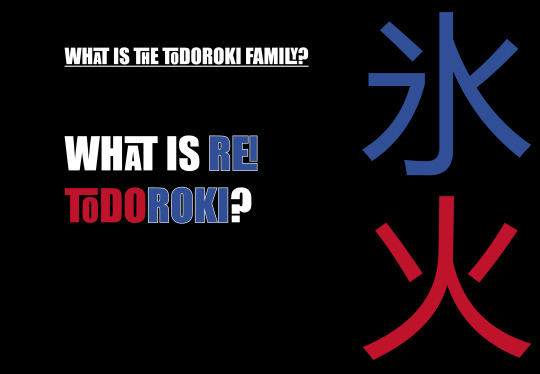
Rei is a daughter of prestige and her family’s last hope to stay relevant. She’s a woman raised in and trapped by the obligations, power, money, and structure of an old society that is doing everything it can to keep from crumbling.
But she’s also complicit in helping to uphold it. Rei is definitely a victim, but she’s also definitely a perpetrator. ‘Cause that’s how it works - people under the thumb of one kind of authority or abuse often perpetuate it and continue the cycle.
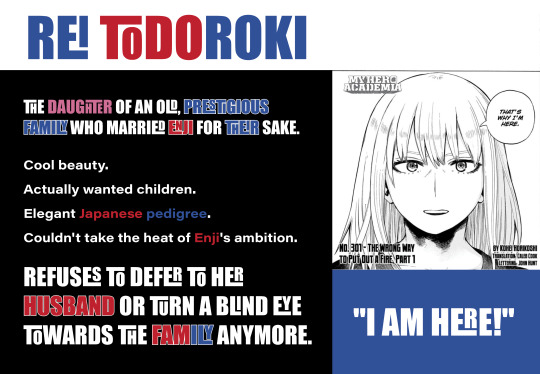
Rei’s given name means, as written, cold. It’s simple, but fitting. She is often emotionally unavailable and unable to connect with Enji and her children (especially Toya, but that’s a two-way street.). It’s one of the contributing factors to why she didn’t “see” her son.
Yuki-Onna and Yamato Nadeshiko
A yuki-onna, or snow woman, is a figure from folklore. They are described as beautiful women who appear on cold and snowy nights. The Wikipedia page I linked gives a good picture of the wide variety of yuki-onna stories out there and of the nature of this figure for your reference. But Rei, while a more human character, definitely suggests a yuki-onna. I think the stories that associate the yuki-onna with children, specifically the one where she asks strangers to hold a child (and survive holding it, in which case she generously awards the holder) or associate her with mountains, are the most interesting for this discussion considering the other mythological and cultural associations present in the Todoroki family.
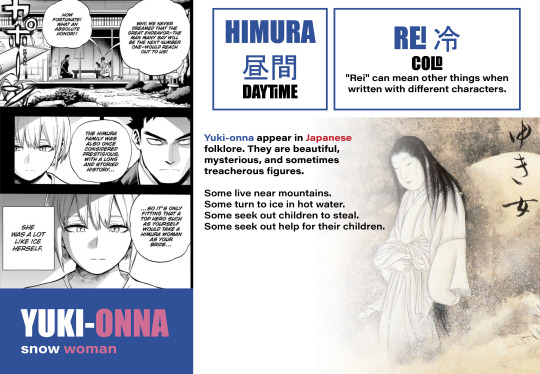
Rei is also a sort of yamato nadeshiko figure, or an idealized Japanese woman. TVtropes did my work for me on this one:
“Being a yamato nadeshiko revolved around the Confucian concepts of Feudal Loyalty and Filial Piety, which…meant acting for the benefit of one's family and obeying and assisting authority figures…Virtues include(d) loyalty, domestic ability, wisdom, maturity, and humility.”
A nadeshiko is, in English, a dianthus. I know it by the colloquial name Sweet William.

The white-edged flowers kinda looks like Fuyumi’s hair, no?
However, Rei is a yamato nadeshiko with a twist! Rei’s character starts out as a doormat, totally broke and unable to handle life in the Todoroki house, and then later finds the resolve and underlying “iron will” to face Enji, the family, and her mistakes again. Women aren’t naturally “perfect” in any sense of the word, ever, and they definitely don’t naturally (or even unnaturally, even through dogged effort) fit the mold of the yamato nadeshiko (at least, not every waking second of their lives.) But they can grow stronger over time, just like everyone else can. Rei becomes more like a “true” yamato nadeshiko after she stops trying so hard to be one for the sake of upholding her marriage and socially-acceptable appearances and instead approaches the situation from a place of collected, experienced resolve.
Yamato, as all these sources’ll tell ya, is an old term for Japan. “Yamato” is the name of the clan that set up the first (and only) Japanese dynasty as well as the name for the actual seat of government they created (and yeah, the Yamato seat was located on a mountain.) Today, “Yamato” is also the ethnic majority of modern Japan. Wikipedia has the most succinct brief on how Japan, despite its efforts to brand itself as one homogenized and harmonious Yamato people, definitely ain’t one.
Likewise, the yamato nadeshiko was a propaganda tool to encourage women to behave “correctly” and paint the picture of a desirable Japanese woman. The unreasonable expectation of women to reach the standard of the idealized yamato nadeshiko was, and is, total bullshit.
Miai and Traditional Marriages
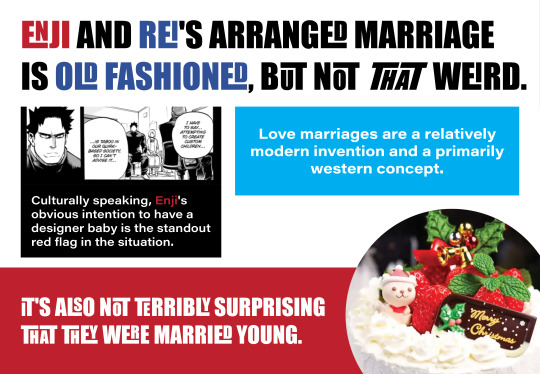
It’s old-fashioned, but not scandalous or inherently skeezy that Enji and Rei had an arranged marriage. Miai, or matchmaking meetings, are still a thing today in the real world and would likely continue to be a thing in the analogous-to-the-real-world’s-present future setting MHA presents, especially for someone like pro Hero Enji. He didn’t have the time or interest to date around, and he needed a marriage of business and mutual interest rather than love (and I don’t just mean “marriage of business” for the purpose of producing designer kids, though that is absolutely what he did and everyone involved even knew it.) Rei’s family are also exactly the kind of family that would desire miai to arrange the most mutually beneficial marriage possible - regardless of Enji’s involvement.
In the grand scheme of history, marriages for love being the accepted norm is exceptionally modern, and while love marriages are increasingly common in many places including Japan, they certainly are not “traditional”. Here’s a blog about Japanese marriages written in 2002 that may contain some interesting tidbits bridging the new and old traditions. Here’s a brief history of marriage in Japan.
Also, Enji and Rei were married young. Overall, the Japanese, especially women, are expected to marry young, though the mean age for women at their time of marriage has increased as time has passed. There still exists, especially for Japanese women, an expectation to marry younger, or at least marry while “in their prime”. If you watch anime, you likely already know what a “Christmas cake” is in modern slang. (That article does a fantastic job of illustrating western envy and postwar Japanese cultural shifts using the adoption of the Christmas cake as a case study.) If you don’t know, a Christmas cake is a slang term for an unmarried woman over 25. Because apparently, a day over 25 means she is past her prime for marriage and has “expired”.
Marriage fulfills certain social obligations even among middle- and lower-class Japanese citizens, but while Rei would not be alone in feeling the pressure to get married for the sake of her family, she would feel it the most acutely because of her status.
Appearances and Divorce in Japanese Society
Rei could divorce Enji, it’s true, if she had his agreement to do so or if she had sufficient evidence to prove it in a Japanese court. Which, good luck. Because while we know Enji was brutal and abusive in training, which parent actually burned Shoto and left a lasting scar? That’s right. Rei did.
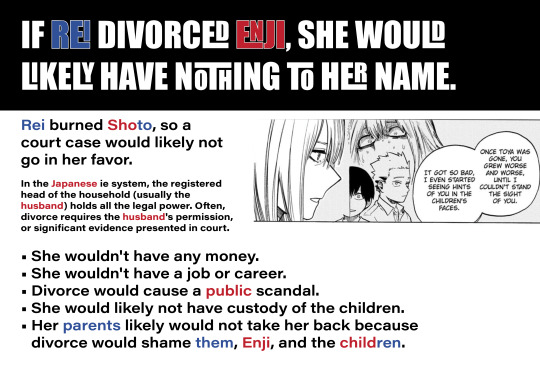
So Rei’s divorce likely would have totally fucked her and the children over. For one, she’d be stripped of the Todoroki family name and likely any Todoroki assets, and since she’d be breaking the deal made between Enji and her family, her own family likely would not take her back!
Divorces are becoming more common in modern Japan, but it’s important to remember that the stinging double-standard of “divorce is okay, except if it’s ONE OF US” that the upper classes (or just the exceptionally proud or wealthy) impose on themselves is brutal. If the public knew Rei had divorced and were given no context - which they wouldn’t get because shaming one’s (ex-)husband and family by sharing those details publicly would be considered crass and unthinkable - the public would likely rip her and the children apart even if they ripped Enji apart, too.
Remember: keeping up appearances is everything in Japanese society.
Rei living outside the house in a facility for her mental health is already shameful and potentially scandalous enough, and it wouldn’t do her any favors in court regarding custody of the children, anyway. Instead, she chooses the limbo of remaining married, but separated.

The Rindo Flower
Yes, I have read meta about Rei’s favorite flower being a rindo flower. I’ve seen it in this post from @foundouthatdabiistouyatodoroki and on Reddit, as well as just, like, around the fandom. I agree that the flower’s presence is often a stand-in for Toya, but I also think it stands in for the ghost of Enji’s, well, not exactly love, but his affection and promise to Rei made via their marriage.
Remembering that Rei likes a flower and showing that he remembers is kind of, like, the bare minimum, but it’s somethin’, I guess.
The rindo, most likely the Japanese gentian in English, is, well, a gentian.

The flower’s color suggests the indigo of the aizome dye, a traditional Japanese color, and its meanings include compassion for sorrow, justice, and… victory. When held upside down like Rei presents it during the hospital scene, it implies loss. (The gladiolus, which the article mentions as another flower of victory, is named because the leaves and shape so resemble a sword. Well, to the Romans, the word for “sword”, and was also a euphemism for a dick. Gladiators, or “sword-ers”, were talked about in terms of their masculinity, victories, and how many other things they penetrated with their “swords”. Real classy. Source? All my history classes.)
Considering Rei’s status as a sort of “blue blood”, I think it’s interesting to note that gentians are the flowers that appear on the Minamoto crest (though the crest most likely uses the less-specific-than-the-rindo balloon flower from the same genus.) I don’t know if associating Rei (and her kids) directly with one of Japan’s major noble clans (and the same one that the Tale of Genji centers around) was Horikoshi’s primary intention, but I think the connection is still worth talking about.
As that Wikipedia article can tell you, the Minamoto name was once given to imperial family members who could not inherit the throne through the family line. It’s fitting for Toya, considering how his father decided he couldn’t be a Hero that surpasses All Might despite being the firstborn son who was created for that explicit purpose.
Let’s talk about that, actually.
What is Toya Todoroki | Dabi?
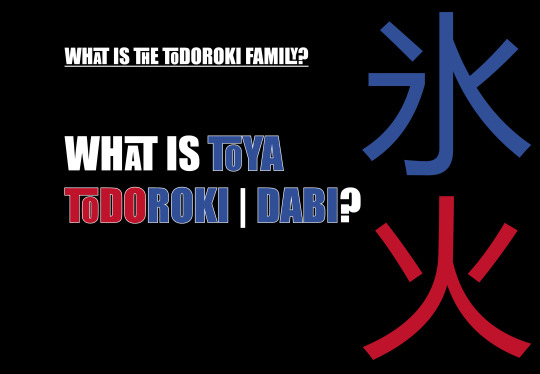
What is Toya? He’s the first son of a wealthy family with noble blood in him who was utterly crushed by the thought of failing to uphold the social obligations into which he was born.

Personally, I consider Toya to be the most fragile major character in the entire series, contested for the spot only by his own father, Shigaraki, and possibly early series Bakugo.
Toya, or more precisely Dabi, is Enji (and Rei) Todoroki’s very own monster. Instead of a “perfect creation” like intended, he became, well, whatever you want to call Dabi.
But let’s talk about Toya first.
The Role of Firstborn Sons in Japan
Firstborn sons are fucking important in Japan and in many other eastern cultures. Generally, they are obligated to inherit just about damn near everything and, in return, are tasked with basically all the responsibilities of honoring their parents. A Japanese family isn’t just a series of blood ties, but an institution. This system, called ie, has its own legal rules. Under the ie system, the firstborn son and his wife (who is likely doing most of the caretaking) live with the parents to continue the household. The other kids are expected to marry out or go start their own families.

Of course, not every single family follows these rules, but the social norms and pressures to uphold them exist. This academic paper written in 2007 analyzes why certain children in the birth order may live with (or near) their parents and explores several factors that impact this decision within families (usually related to whether or not the parents are providing childcare for the grandchildren.) Here’s a fun quote from page 3:
“...the first-born child generally lives with or closer to his/her parents than the second-born child, a result which is consistent with both our theoretical model and Japanese social norms. Second, there is one exception. If a first-born child is a female and she has at least one younger brother, then she locates farther away from her parents than her younger brother even though she is a first-born child.”
More on that “second” part in regards to Fuyumi later.

But, like with most cultures, the more traditional (and established and wealthy) a family is, the heavier the predetermined responsibilities of each household member weighs on them. And Enji Todoroki’s family is high-profile. So, you can imagine that the pressure placed on Toya is immense.
The pressure placed on firstborn son Tensei Iida was immense, too, but their family dynamic was totally different. The Iida family was, like, healthy and functional. Wild.
Moving on. So Toya was not only youthfully excited to impress his father and support his family as the firstborn son, but he was also, in a certain sense, socially conditioned to want to do so.
To me, this is where things get interesting. Toya’s struggle is not against his parents for crushing his dreams of a life beyond what they and their society’s established roles provide him. Instead, it is the opposite. Toya’s parents are ready to shake up the established family formula and free Toya from many of the obligations of firstborn son duties. Toya is not ready for any of that newfangled modern sensibilities nonsense. According to tradition, Toya’s role and life should be set and secure.
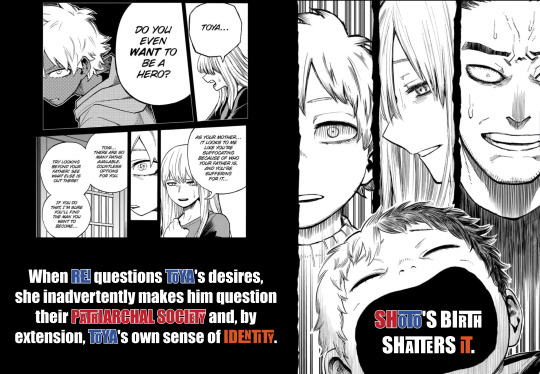
When Rei asks Toya if he even wants to be a Hero, she inadvertently makes him grapple with the possibility that carrying on the family business (or at least carrying on the to-be tradition of becoming the Flame Hero and surpassing All Might per his father’s wishes) is not a given. Other choices exist. Rei’s question, while well-meaning, creates a fissure in Toya’s faith in the patriarchal system from which he developed his entire identity.
If Toya, the first son, can’t use his flames, isn’t a Hero, doesn’t inherit, and won’t continue to live with the family, who is he? If he doesn’t fulfill that role and those obligations, is he worth anything to anyone, even himself?
Conventional wisdom says no. He would be a disgrace and a failure even without Enji’s dumbass “create a genetically ideal child to use the ultimate flame quirk to surpass All Might” scheme in the mix. For Toya, it was never about surpassing All Might, not really. It was about fulfilling his household role and showing his father that he was worthy of being in the family.
When Shoto was born, Toya saw that door slam shut. After that, his inability to embrace another way of life leads to his undoing. But he is also, you know. 13.
Toya, through no fault of his own, cannot handle his father’s flames - not his flames of sheer power, not of mindless effort, not of personal fear, not of burning western envy, not of national pride, not of anything. But Enji burdened Toya with them anyway.
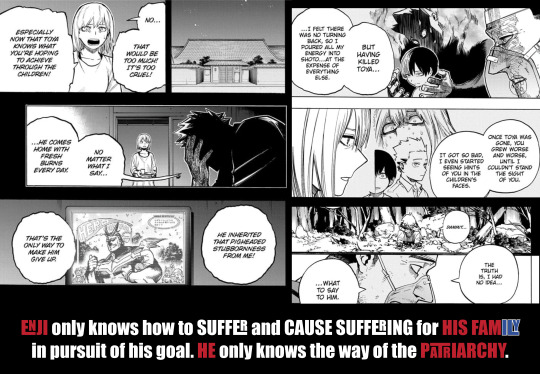
Arrows, Hamaya, and All Might
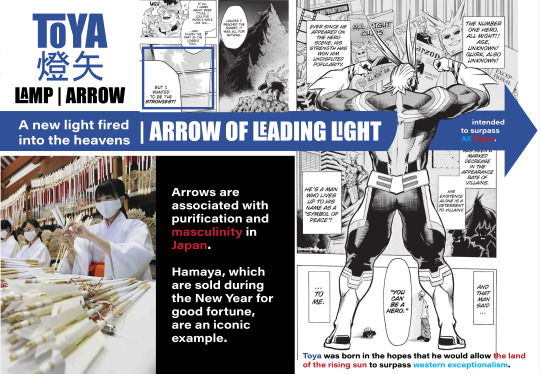
The characters in Toya’s given name mean “lamp (or, like, a light)” and “arrow”. @skyflyinginaction and their mutuals have an early discussion about his name and its possible meanings as well as a discussion about symbolism here that’s fun to read, and I’m always happy to not have to do any more work - er, happy to give credit where it is due for research and thoughts. But I do have more to add.
Arrows and archery have particular connotations in Japan. The ones I most commonly think about are hamaya, or evil-warding arrows, used ceremonially. Hamaya can be purchased at temples to be displayed in the home as luck-bringing or evil-warding items. Of course, the bow is also a significant evil-warding symbol, and the bow and arrow are often meant to appear together as a set of evil-warding objects, but yanno. Whatever works.
Anyway, around the New Year, archery contests and traditions abound as a way to predict the coming year’s fortune or ward off evil. This blog entry details one day of tradition in Ibaraki as well as the associations with masculinity and, erm, promoting fertility.
There’s one more tradition I learned orally, so I can’t source it, though the purpose for it was different than the one I just linked. In the one I was told, the head priest opens the yabusame (horseback archery) ceremony by firing an arrow through the temple gates and off the side of the mountain to slay an invisible demon. The firing coincides with the sun’s placement and becomes, much like Toya’s name suggests, an arrow of light.
In any case, arrows are associated with luck, sons, and warding off evil. I get the sense that the “arrow” in Toya’s name brings all of these cultural associations into play. More specifically, I get the sense that Toya was meant to be the “arrow of leading light” meant to slay the “evil” of the west, All Might, and purify that uppermost and unreachable peak where All Might stands in Enji’s mind. Don’t quote that, though.
‘Course, the “guiding light” or “purifying light” implied by Toya’s name eventually becomes perverted from its original purpose.
Toya’s Cremation
According to the manchild himself, Toya died not when he burned the shit out of himself on Sekoto Peak, but when he thought his family had replaced him. That’s when he says Dabi was born.
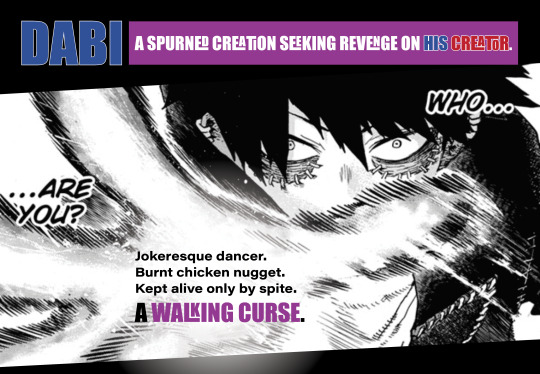
The word Dabi means cremation. Heh. The enthusiastic @foundoutthatdabiistouyatodoroki posted about why and how it may be written as something indirect instead of something more direct for the sake of Japanese sensibilities.
I’d also like to point out that Toya’s body was not properly, ritually buried or cremated in any sense or tradition. This is important, since the failure to do so often prevents the spirit from passing on to the afterlife!
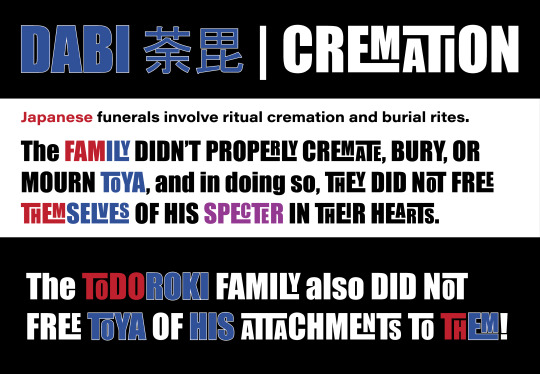
Arguably, Toya cremated himself, but not all the way and not in the way that aligns with the intentions and purpose of a kotsuage, or funerary cremation ritual. Also, his family did not pick out his bones - the authorities did when they found a piece of his jaw. That linked article talks more about the significance of the tradition, but put simply: the family didn’t properly mourn Toya, and in doing so, they did not free themselves emotionally of his specter. They also didn’t free Toya from his attachments to them.
This life-to-death stuff is a two-way street, and Toya’s soul was left hanging onto a burned, rotting corpse by the thread of his own grudge. He’s a modern horror story.
Dabi’s Horror Inspirations
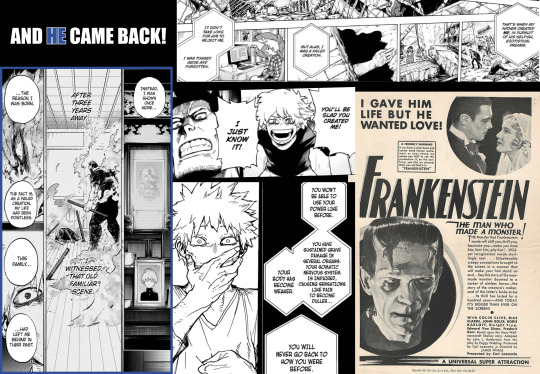
That’s right, Dabi fans! It’s time to talk about the well-known Frankenstein allusions present in the character - though I’m pretty sure Horikoshi pulled from the 1931 film and not the book. Whatever.
As Toya, Enji’s creation was an ice quirk + a fire quirk instead of a (cold) corpse + a reintroduced (hot) spark of life (and later, half of his “father” Victor Frankenstein’s own brain) like Frankenstein’s monster. Frankenstein’s monster’s weakness, at least in the movie, is fire. In the book, fire is still present and double-edged.
As Dabi, Enji’s creation is a reanimated corpse (wow!) + a twisted sense of self created from Enji’s own will (wow!) who seeks revenge on his creator and family for his loneliness and creation. His weakness is, uh, yeah, it’s still fire.
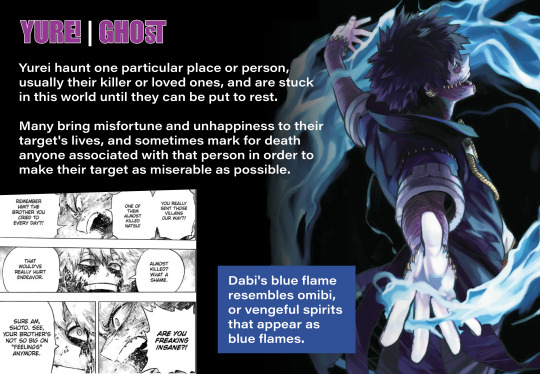
While Enji is not the one who recreated and revived Toya as Dabi, it is Toya’s grudge (and desire to see and be seen by his father) that keeps him alive. In fact, Dabi is a really cool twist on a yurei or perhaps an ikiryo since he is technically still alive. Still, Dabi most closely seems to follow the patterns of an onryo, which is a more specific form of yurei. These spirits, and the story of one in particular, are the inspiration behind the Japanese Ju-on: The Grudge movies (and then their US-made counterpart.) Here’s a bit from the onryo entry from yokai.com not ‘cause it’s the most academic, but the most succinct:
“Their motive is always the same—vengeance. Onryō are easily powerful enough to kill anyone. However, they prefer letting the object of their hatred live a long life of torment and suffering, watching loved ones die in their stead. Onryō inflict a terrible curse on the people or places that they haunt. This curse can be transmitted to others like a contagious disease, creating a circle of death and destruction far more devastating than any ordinary ghost.”

You may decide that the entry for the gyoro or another yurei suits Dabi better, but surely you see the point that he’s playing the role of some kind of ghost. His eerie blue flame suggests onibi, or resentful spirits taking the form of blue flame. Wikipedia also does me a big favor by mentioning the overlap between onibi and European will o’ wisps, which usually lead people astray towards goals they can’t reach!


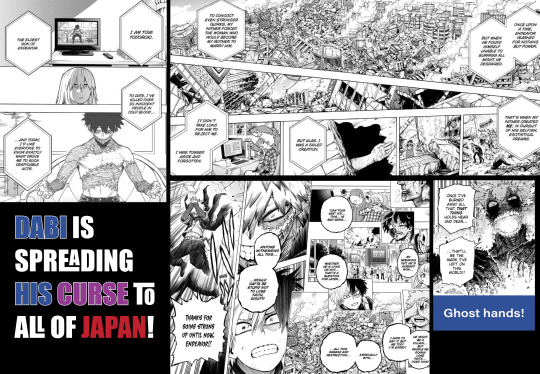
It really would have been better for everyone if Toya hadn’t pursued the incredibly hot blue flame, huh? Instead, he just burned out fast. Kinda dissappointing and anticlimactic - like a dragon’s head on a snake’s body.
Yeah, that’s right - Dabi seems to have renamed himself “dissappointment”. Heh. Tweens and teens really are the funniest people on the planet.
The First Son Passed Over for a Second Time
But perhaps the funniest and most horrible detail of the whole manga is the implication that All for One and the doctor took one look at Dabi’s shambling corpse escaping from the nursery and went, “Yeah, let that one go. He’s a little too pathetic to be the next vessel or organ for infinite hatred to fuel our big schemes.” Like, absolutely nobody (except the very family he thought replaced him, and boy, are they a shitshow), not even the villains that seek out pathetic people in order to use them, wanted Dabi.
Dabi is, in many ways, Doctor Garaki’s “First Son” vessel experiment for All for One, and he was passed over in favor of Shigaraki in much the way Toya’s father passed him over for Shoto due to how unsuitable a vessel he is.

When Dabi faces Geten, the ice-quirk user whom ReDestro treats almost like his own successor, who believes that a powerful quirk (and strong sense of individuality with a need to express it) is the only thing that makes someone worthy of living, who exists as his weird mirror with a more weaponized and powerful form of Rei’s ice quirk, I wonder if he thought god was laughing at him. I know his face and skin began splitting apart as if to show his true identity (a dead kid upset at his family) and show a waver in his resolve to stay alive to accomplish his goal, but I’d love to know if he has any ideology outside of his grudge towards his father and family.

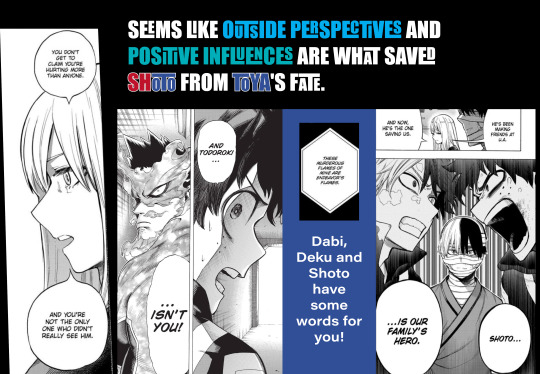
If Hawks told Dabi to his stapled face his real reasons for helping Endeavor, what would Dabi say? Heh heh heh. Dabi learned not to trust Rei, Fuyumi, or his own brother Natsuo, so I’m not terribly surprised he never trusted Keigo in the first place.
Keigo, who never thought to watch Dabi. Keigo, who had to ask who Dabi is. Keigo, who also didn’t see him.
Keigo, who wants to take Toya’s place.
But let’s talk about Toya’s other siblings... in part 2!
#todoroki family#bnha meta#bnha manga spoilers#dabi#toya todoroki#enji todoroki#endeavor#shoto todoroki#shoto#rei todoroki#fuyumi todoroki#natsuo todoroki#hawks#keigo takami#todoroki presentation
357 notes
·
View notes
Text
Yooo, eeeextra long, kinda rambly dabihawks post incoming. I talk a fair bit about myself, because that's where my experiences come from, shocker there. God speed.
Woooooof here I am being extra emo about dabihawks tonight, so sit back and pull up a chair while I make good on outlining exactly what my main malfunction is concerning them, for the 3 people that care. One ticket to sad bitch island, population: me.
So I'm beginning this by saying; no this is not about canon dabihawks, I do in fact think those bitches are not good for each other from what I've seen, HOWEVER. I tend to look at things as they could be, not as they are, and the potential here is just ridiculous.
Source? Me. And people I know. And what I mean by that is I've lived as close to Dabi's life as I feel anyone is going to get without turning into a real life murderer, and I know plenty of people (myself included) who share plenty of attributes, aspirations etc with Hawks as well.
And I know, I know, they're fictional characters and there's no way anyone can pin down who they truly are, but I guess that's kind of my point. There's just enough suspension of disbelief that you could explain away pretty much anything, but that's true for most fanon pairings, and not my point.
SO. Onto my main point.
..........Human nature.
I hate to get all psychological but STAY WITH ME. As long as I can remember I've been very independent, the "I don't need anybody" type, because life had so thoroughly kicked the shit out of me that I was downright afraid of human connection because it always ended badly and I was always so hurt by it. Well now, later in life, and a couple diagnosis later, not only can I better sus out which relationships are worth pursuing, but I can understand what I'm looking for from other people and how to get it. And do you know what it is that I want now, no matter the cost to myself? Yessir, it's love, as fucking cringe as that is for me to say. Who saw that coming, eh?
There was a meme of sorts another user posted on Tumblr of the LOV and what they all wanted most as tweets or something, and someone else edited it(?) to have all of their reasons just say 'LOVE ME, LOVE ME, LOVE ME', and that lives rent free in my fucking head.
I hate to be the bearer of bad news, but it turns out love is, in fact, the answer.......(*soft gag*) Shit do I hate to admit that.
SO ALL OF THAT TO SAY.
Dabi and Hawks understand at least broadly what the other has gone through, so they would at least have a vague understanding of one another from that. People underestimate the power of empathy.
I'm gonna be kinda toxic here and say I'm at a point in my life where I need a partner to argue with. I need to bicker, and I also do NOT need to be surrounded by yes men, I need someone to call me on my bullshit, and I feel like they would truly be like that together. Going along with the understanding, I feel like they're very well suited to holding the other accountable.
Their chemistry in my mind is undeniable. I'm a red/blue pairing bitch, I have no defense for that one.
And I'm not gonna lie, at this point I'm having a very difficult time articulating what other reasons I have beyond projection, so perhaps I'm full of shit??
There's the ever constant popular trope of both their relationships with Endeavor complicating things, their quirks being incompatible, the, you know, literal backstabbing etc, but for my purposes that's all neither here nor there. Because there is something about their relationship, both as it is and what it could be, that makes me half feral. It's The Good Shit™.
Yet again, all this to say that I truly believe despite Dabi's villainous tendencies and Hawks' position as the No. 2 hero, at some point both of those shits are going to be mighty sore for a similar connection, and I truly believe they are best suited for one another.
#it took a literal month but I did it *finger guns*#bnha#boku no hero academia#mha#my hero academia#dabi#todoroki touya#mha hawks#bnha hawks#takami keigo#mha meta#bnha meta#dabihawks#hotwings#lov#league of villains
23 notes
·
View notes
Note
Hi! I saw some people saying that Hawks is gonna have a mental break, but honestly I don't see that happening currently, do you think there is a chance for that?? (I tough only him realizing that villains can be saved through Ochaco but nothing more than that maybe him been involved on the Todoroki plot but it's seems that they are now far away from him)
Maybe you are focusing on the extreme negative connotations with the word "mental break" and not really reading it for what people mean when they say that, which is:
Hawks's walls that close him off from everyone and everything and his own true emotions need to finally come down. And that happening is not going to be a fun or smooth or easy process. He needs to "break", as in, those mental walls/barriers need to break. And with that, an emotional and mental "break" should follow behind it.
I can vouch for several friends of mine who desperately want to see him cry. That's really what people mean when they say mental break. Because Hawks won't cry, he won't express hardly any emotion right now because he's not facing what he's done and what he really feels. I wrote about the villains needing to CRY and I feel the same applies to Hawks. The cathartic emotional and mental release people are wanting is because they want him to face his actions, face how he really feels about them, and challenge his way of thinking. That is not an easy process (See: Tomura), so it shouldn't just be something he casually shrugs off like no big deal. If you're thinking people are wanting a legit psychotic break then no, that's not true. And if they are, well, weird, but that's not the crowd I'm talking about here.
I'm sure you didn't want a whole thoroughly thought-out response to this but this is the consequences of your actions (jk)
You brought up Ochacko as Hawks realizing villains can be saved, and yes I agree that's a thing that should happen. Hawks killed Twice, and then proceeded to say he wants to be like Twice. That is not a normal thought process. And in the act of killing Twice, he struggled internally due to his own conflicting feelings on the Jin Bubaigawara he grew a sort of attachment to before the PLF raid, and used language indicating that he genuinely felt pretty fondly of Twice---and then proceeds to stab him in the back (literally). I highly recommend checking out @transhawks meta on the interaction between Hawks and Twice before he killed him, as it really points out some of the emotions Hawks was cycling through in that moment. Also, re-read that scene anyway because you can clearly see Hawks struggling with the situation, only to snap at the end.
So again, even within the context of fictional bnha it's not normal for Hawks to stab a guy in the back and murder him, express pretty much zero remorse about it at all, and then proceed to say you want to be like him because you like him as a person.
Hawks and Twice were put into a mirror situation of Izuku/Tomura, Shouto/Touya, Ochacko/Toga. Twice was Hawks's villain. And Hawks actually kickstarted the whole narrative of attempting to save a villain you've formed a connection with by appealing to their needs in some way and using who you are as a person to that villain. The thing about their situation is that Hawks failed. For obvious story-telling reasons, like he can't accomplish what the kids' goal is before they do, before they even get a chance to entertain the idea of it. But for character-related reasons such as Hawks refusing to face himself and be vulnerable. Twice was just openly vulnerable 24/7, but Hawks didn't let his walls come down even one bit, which was the problem in their dynamic. The problem extends beyond that because Twice is gone now, and you can see that Hawks won't even be vulnerable within himself, to himself, for himself. He just won't do it. And with these hero/villain pairs the manga has set up for the end game, vulnerability from BOTH sides plays a huge part in the kids succeeding at their goal of saving. Hawks refuses to do that, so therefore he failed.
And rather than reflecting on his time since then, what we get when Toga!Twice shows up again:
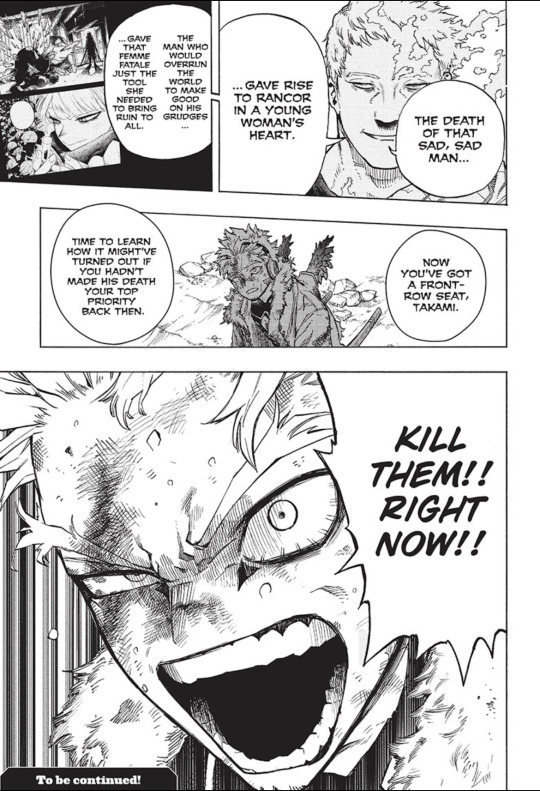
is Hawks immediately resorting to killing him again, still not facing the mess of a situation it was when he did it for real back in the PLF war.
When Hawks talks about Twice in the way that he does--such as wanting to be like him and liking him as a person (yk like when he killed him), it's framed pretty ominously:
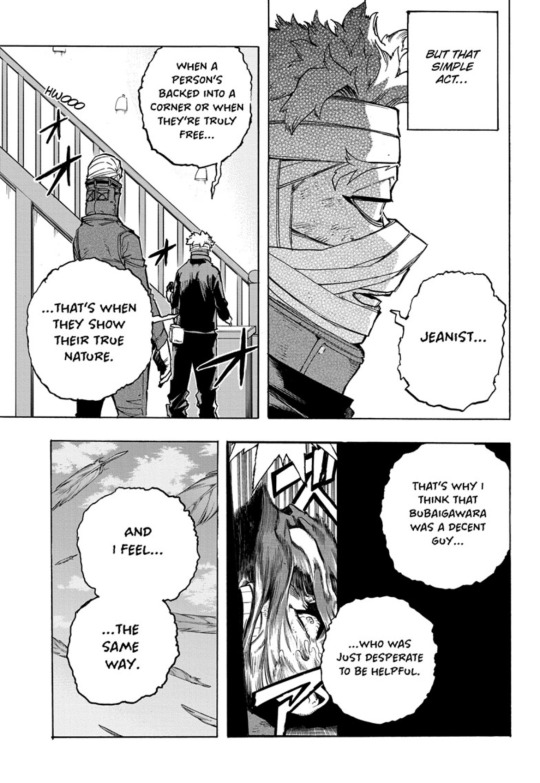
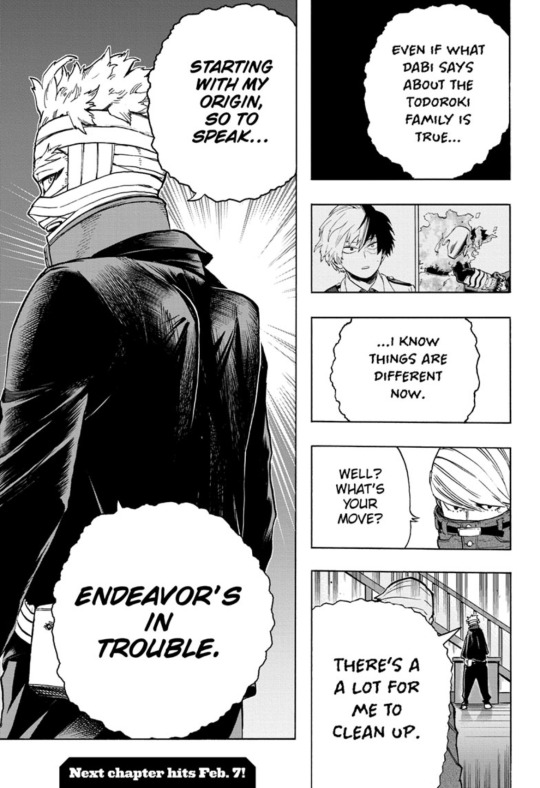
And this panel brings me to his involvement with the Todorokis.
Do I know how Hawks's involvement with Toga will lead into/tie into his involvement with the Todorokis? No, I don't and can't really see the pathway YET, but he's tied to both and it's uncharacteristic of Hori's writing style to leave things unfinished/unaddressed, so I'm confident he's going to make it happen.
Hawks and Endeavor, my god. Hawks, for lack of a better way of phrasing it, wishes Endeavor was his dad. It's coded this way, Hori doesn't go out of his way to beat the allegations either with his art:
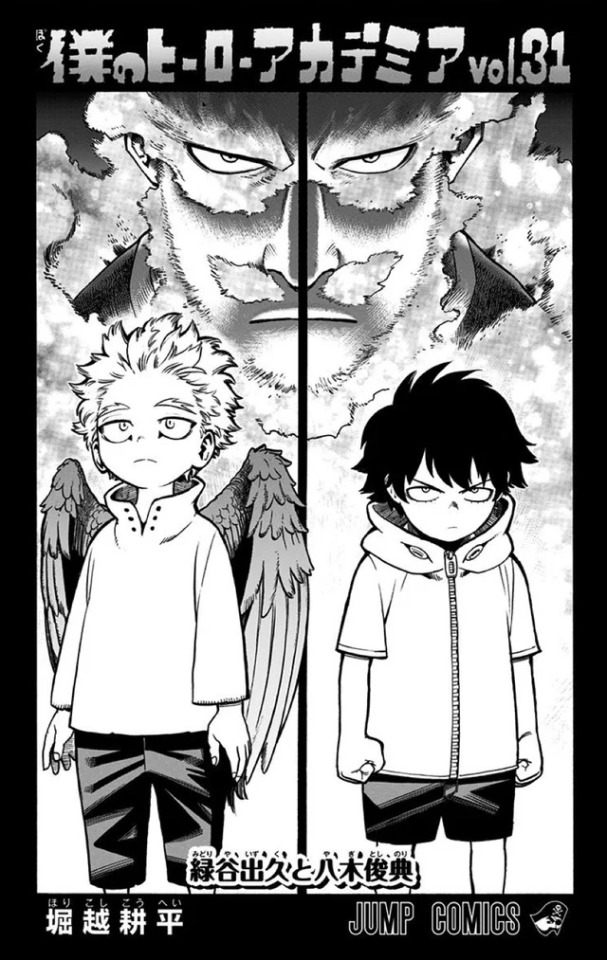
Hawks's parasocial attachment to Endeavor (who quite literally never pays any extra mind to Hawks or spares a thought toward him during this whole final arc (or ever tbh)) is not a good thing. It's not cute, it's not sweet, it's not a normal admiration. Hawks's commentary on the Todorokis, his intrusion into their conversation during the hospital chapters, his curiosity about special details (like Shouto's eye), him insisting on just supporting Endeavor literally no matter what--there is nothing positive about that. Hawks even says it himself that he admires Shouto for facing his family's problems, when Hawks never got to (through no fault of his own, but this is a testament to how he feels about the Todorokis). In a sense Hawks just...wishes Endeavor was his dad. I mean that's the most blunt way I can put it. He views Endeavor (the doll) as a source of comfort, like a child would/should their parent. Little Hawks and little Touya being placed in front of Endeavor, whose face is split evenly on the page, is not subtle. It's clear a choice has to be made, and Hawks is not the choice Endeavor is going to make. Touya is.
Now, if Horikoshi wants to write a satisfying conclusion for Hawks similar to that of the LOV setup to have an emotional catharsis moment later on, then he'll make this impact Hawks believably. That should NOT be something Hawks just shrugs off like it wasn't a big deal. Because it 100% will be/should be treated AS A BIG DEAL. He's clung to his image of Endeavor since he was a child. Endeavor the hero, who beats bad guys. Not Enji, the father who rejects heroism in the name of saving his villain son--who burned Hawks's wings and went after his mom let's not forget. That is not something we've seen Hawks contemplate internally. The whole fight Hawks is worried about Endeavor, meanwhile inside Endeavor's head he's thinking about himself or his kids. The relationship is not the two way street Hawks would want it to be. And it's gonna be made clear, and that should hurt.
So, two major things here that really shouldn't be just "¯\_(ツ)_/¯" moments for Hawks. Ochacko saving Toga (dressed as Twice) should be a pretty jarring awakening for Hawks that HE tried to save Twice, but he failed. But Ochacko is succeeding in saving Twice's friend. It should be a pretty upsetting event to look back on that situation and realize that killing Twice really wasn't the answer, or the only options, because Ochacko saving Toga (again, currentlydressed as Twice) is living proof. Hawks failed, and Twice, the guy he says he likes, is dead. Endeavor choosing family (Touya) over heroism (Keigo) should also be upsetting, because his childhood ideal Endeavor is gone.
Both of these things happening should be challenges to Hawks's thoughts and feelings about himself, and that should not be a smooth process that doesn't involve strong emotional reactions from the character. There's a LOT left to be done with Hawks and that's why people want to see it.
Am I confident that it'll happen to the level of that I am confident Tomura, Touya, and Toga will be saved? I wouldn't say I'm that high up on the confidence scale, just because Hawks has always been so weirdly handled by Horikoshi that I scratch my head at his choices with Hawks sometimes. But I AM confident they will be addressed. Hawks maintaining his cool guy demeanor would be really stupid and disappointing tbh, especially because the LOV losing their "cool" demeanor elevates their stories so well and I think Hawks deserves the same treatment.
256 notes
·
View notes
Note
My brain was turning a P5 fic over when it got distracted by a Quirk-related thought.
Does Hawks molt?
I don't see why not, though given the length of his feathers I assume it would be more like how larger birds molt. Though, his telekinetic feather control could pose some interest questions regarding this
23 notes
·
View notes
Note
He has his hero suit under the biz suit, a sword at his back, has resumed being cheerful & expressive, & continues to be called “Hawks.” I’m still digesting all of this. Many change but also not much at all.
I'll be actually serious in answering this - yes, some of the development is lacking, but I also think there's a step in the right direction.
I've said over the years a lot of Hawks's issues are over agency and choice, yes?

He spells out here: he cannot refuse. In some ways it's because he as a person (as Hawks/Keigo) could never just sit back and not do anything, but also because they won't let him. Let's remember what else is in this part of 192 because I think it shows how clear the relationship is.

He's bowing. He's acknowledging his subservience here. He's below her.
One of the worries of the manga with Hawks's narrative is that he would always fall into this pit of letting other people make decisions for him no matter what. I strongly believe he essentially also caged himself here because while he could break out, there were consequences.

However, let's look at Hawks's "breaking free", which I think was illustrated to be looked at along with these panels.

While I argue Keigo isn't free here, not of the cage he's imprisoned himself, he is literally free of anyone ordering him to do anything he doesn't want to again. Nagant even mentions he must have been ordered to do horrible things. So, I do want to say that one the biggest issues, it seems, at the end was Keigo not having control of his own life.
While I do think there's more he could be doing, the idea that he can make his own decisions, that he's now so high above everyone that his life is no longer as expendable as it once was, might indeed be an improvement.
I'll save this for a longer meta, but Keigo was always curious for being a caged bird who couldn't fly free in his imagery, but his skills were always impeccable control - over his quirk and over others. The manipulation was really what caught my eye initially. And it provided lovely irony for someone who hasn't ever really controlled his life and desperately believes he can't.

He could have said no. Mera was there, even if he sorely needs a nap. Hawks doesn't have to or need to be the new Prez/Chairman. I think he wants to be, because he realized he can't shape the society he stated he wants all along from where he was. That it was the people running the society who made him false promises and maybe he can do better. Can he? Pardoning La Brava and Gentle is the right step. Retiring the Hero part and likely making "heroes" less prominent in their society is a good step. Allowing Nagant to whatever she likes is a good step. We need to see what happens with Toga/Spinner/Compress as well, because Hawks now controls their fates, too. He has a lot of work to do. He has a LOT to make up for. But he can do more like this, than as a hero. He doesn't need his wings to cause change. Just the mouth and sharp wit he had all along - and that made him interesting in the first place. And that's why I think this final image pulls it together. It is literally the image above, but a very different sort of Keigo. Maybe it's the light-hearted one we should have wanted all along.

#i was so struck about how perfectly this image mirrored the other one#hawks#takami keigo#asks#meta#bnha spoilers#my meta
81 notes
·
View notes
Note
(large spoiler) Ever think that quirkless Keigo is just gonna keep going with his model career?? Like he's not a pro hero anymore, so he just keeps the modeling gig?? I wanna know your thoughts on this lmao
Hii!! Small disclaimer, I’m actually not caught up with the anime, let alone the manga, at all, so most of what I say is based on snippets I get from fanfics and meta lmao
Hmmm this is really interesting. Short answer: I think with the way that Keigo has finally been set free (symbolically with losing his quirk, and literally from the HPSC (I think)), he’ll probably stop everything else related to Hawk’s job as well.
Slightly longer answer:
From Horikoshi’s perspective, Keigo has already served his original purpose as a character so it wouldn’t really make a difference either way canonically. If he does intend to have those ‘5 years from now’ snapshot, I feel like Keigo will be overseas travelling or something rather than modelling though, if just to be consistent with his theme of being set free. If not as a personal choice, ‘do it for the plot’ lmao. I do mean this quite literally though, because now he’s got so much potential for the ‘self-discovery slice-of-life’.
,,,, but I personally think this is a bit of a cop out choice for Keigo’s future.
I’m not gonna be the analyst who says ‘he never had a chance to make his own choices’ because technically he did. This doesn’t mean he made a good one, but if you step away from popularised fanon, he did agree to going with the HPSC because he wants to be a Hero and not because of his mum. This isn’t so much that I haven’t ‘read between the lines’, but that he never once looked at his mum or made reference to what would happen to his mum if he followed the HPSC. Unless ‘reading between the lines’ include fabricating entire dialogues under an assumption that Hawks was suppressing his memories, I think it’s safer to assume he just couldn’t care less loll. But that’s the thing; his whole life revolved around Heroes, whether as Keigo or as Hawks. Now that it’s been brutally and suddenly ripped out of his hands and NOT in the form of death like he was probably expecting? He has to find something else to do, whether it be modelling or travelling or being a librarian or whatever,,,,, that is, if we make an assumption that he can’t keep being a Hero.
Look, we know he wants to help people. Some might even say he’s kind (that might’ve been drilled out of it by HPSC’s cold blooded training, but hey, maybe it’s just buried really, really deep inside). If we look at this not from a story writing perspective but purely from the character Keigo’s perspective (a bit counter intuitive, I know but bear with me), I honestly think at some point in the far future he might try to pursue a career in Heroism/ the police dpt / the fire dpt (hAH irony)/ some kind of physically-inclined job that traditionally seeks to help people. I think most people tend to stick to things that feel familiar with them even if it’s an unconscious decision.
So how does this link to whether he continues modelling? (because I’ve totally been building up to a point and not just going off on a tangent lmfao)
I think a lot of the fandom sees modelling as Evil, whether this be because of the horror stories of modelling in real life, because of an understanding of mutant quirk discrimination, wing kinks, and thinking Hawks definitely didn’t like being seen in that light, or because of some mixture of other reasons. And I think that’s true in the sense that it probably wasn’t what Keigo had in mind when he first signed up to being a Hero.
With that said, I’ve seen a particularly well written fanfic (I forgot which tbh) where Hawks is explaining the importance of modelling in promoting a sense of safety in civilians, especially for Heroes with anthromorphic quirks, outside of just gaining popularity. Which I think is a really fresh and extremely valid argument. As such, modelling could be a very nice supplement to him regaining popularity or at least, regain familiarity with both the general public but also his roots of inspiring confidence and safety if he decides to pursue any of the jobs I’ve mentioned above.
There is a counter argument, especially for Keigo being a Hero, that the quirkist ideas are so ingrained him (subconsciously or otherwise by the HPSC) that being a Hero again, or just doing any job at all without a quirk probably never crossed his mind. And if he wanted to keep up with helping people, there are a multitude of other jobs he could do. (Which modelling still doesn’t quite fit but ehh maybe as encouragement to/ empowerment of quirkless people?). But, I think this is a rather naive and simplistic analysis of Hawk’s and Keigo’s character of a person too deep into fanon.
If there’s one thing Hawks fans can agree on, please let it be that he’s really freaking complex.
He’s seen the worst and the best of society. He’d just about experienced every facet of society possible as a person in the bnha universe besides being an Average Joe. And now, he’s about to head into the small undiscovered area of quirklessness. (We as readers get a bit of this from Izuku’s POV, but for Keigo this is about as novel as it gets). Speaking as a writer, whether modelling is part of that experience remains entirely on what you want to explore with Keigo as a character.
Lmk what you guys think as well!! (in comments/ tags/ dm/ asks, all are ok :D )
(note: apologies for the barely organised word vomit and non-answer at the end, this was typed impulsively from my phone lmao)
#lowkey completely forgot to touch on anything dabihawks#but I’m running out of steam so I’ll just leave it as it is for now#might come back to it as a reblog later if I ever find motivation lmao#anime#bnha#mha#bnha hawks#text post#bnha meta#character analysis#takami keigo#bnha keigo#hpsc#bnha quirks#bnha fanfiction#bnha manga spoilers#bnha fic#bnha prompt#quirkless hawks#ask
37 notes
·
View notes
Note
For pro heroes, like Endeavor and Mirko and Kamui Woods and Gang Orca and such, what different names would you give them?
2-3 alternate aliases for some of the top heroes? Endeavor, Hawks, Best Jeanist, Edgeshot, Mirko, Ryukyu, Gang Orca, etc.
So three things here: One is that I don't think there are many issues with the pros' names. So consider theses more as alternatives then replacements. Second, I will only cover the non-teacher pros for this, as they could be their own segment for this. Finally, a lot of these characters don't have much going on, so these some of the names are going to be more generic then meaningful.

Gang Orca-The Breaching Hero, Blackfish: This is basically just another name for an orca, but I think it can fit him well enough. It's something that makes more sense and is less intimidating then what amounts to "gangster orca", but still has that less then pleasant feel to it.
Best Jeanist-The Seamless Hero, Topstitch: Yes, this is a pretty obvious tie to his overall look and power. However, I think it fits with Best Jeanist's overall attitude as well. That he's such a perfectionist and will only go for the best, whether it be with his looks or his hero work.
Edgeshot-The Kakuremi Hero, Blindfold: While the epithet fits more with his ninja roots, as it refers to the various techniques ninjas would use to blend with their surroundings, the proper name is in line with his Quirk and usage of it, heavily focusing on stealth and folding up his body.
Ms. Joke-The Gutbusting Heroine, Punchline: Look, I know this is already the name of a DC character, but it's one nobody cares about. Punchline is such a perfect name for Ms. Joke as hero. It fits great with her laughing themed power, her pension for fisticuffs, and is certainly a name she'd pick in character
Mt Lady-The Towering Heroine, Highriser: Not only does this fit with her growing power, but her massive ego as well, already positing herself as a top her. However, it can play a double meaning, representing her eventually growing as a character and being better then she was before.
Sir Nighteye:-The Deadline Hero, Director: There's a lot here. There is his epithet, which fits in with his officer worker look and his fatalistic view on his power. We got the name, which fits with the film nature of his power, his role as the operations manager for All Might, and the idea that his power is the thing causing futures to happen.
Lady Nagant-The High Caliber Heroine, Overwatch: I had so many ideas for Lady Nagant, both names and epithets, such as the Hair Trigger or Firearm. But I decided to go with something more in line with her role as a sniper. Overwatching is basically an ally unit, usually from a high position, warns and attacks an enemy before it becomes a threat. Boy, doesn't that sound familiar?
Hawks-The Fly Boy Hero, Wingman: While there are a lot of feather and bird references I could make with Hawks, I decided to go with something more aviation themed. It just fits with his look and secretly fits with his role as an agent. And sure, Red Ace or Red Angel would be more unique, but Wingman works for me because it fits with his desire to support and help other heroes.
#My Hero Academia#Not Quirks#Keigo Takami#Hawks#Tsunagu Hakamata#Best Jeanist#Shinya Kamihara#Edgeshot#Yu Takeyama#Mt. Lady#Mirai Sasaki#Sir Nighteye#Kaina Tsutsumi#Lady Nagant#Kugo Sakamata#Gang Orca#Emi Fukukado#Ms. Joke#MHA Meta#MHA Theory
39 notes
·
View notes